|

AR
Sandy shore and remote rocks to end the quarter
|
|

|
|
2023 September 30
The Creator
Peter Bradshaw
This colossal sci-fi thriller from Gareth Edwards features vast panoramas and vertiginous vistas.
US army officer Josh fights in a world upended by AI. After the US and its allies banned all AI, the Asian countries stayed loyal, and the AI bots there have created a posthuman population.
Josh is behind enemy lines, gone native with wife Maya. A US attack aimed at the Creator exfiltrates Josh. His commander tells him Maya embodies the enemy AI and he must help hunt and kill her.
A child he calls Alphie is like a tiny Dalai Lama, a creator, or a Christ child of the new AI peoples, with Maya as the Blessed Virgin and Josh as Joseph. Josh leads US forces into hostile territory ..
This intriguing movie addresses the great issue of our age, AI, with tremendous boldness.
AR I found it impressionistic, light on explanatory structure, schematic on character development, and overwhelming in impact, thanks to its Hans Zimmer score.
The theme and plot are fascinating as barometer readings of the Zeitgeist in the West. China and its neighboring states look set to make better use of AI than the West, with a smoother integration.
A war between America and those states could end badly for the US military. US macho messianism clashes with an AI future. Go ponder.
|
|

|
|
2023 September 29
Boredom and Meaning
Elizabeth C Corey
Kevin Hood Gary has written a book about boredom. He treats situational and existential boredom.
Situational boredom comes and goes and is related to a lack of agency. The cure is to be swept up by some external force or to independently determine a course of action.
Existential boredom is characterized by a disenchantment with life and a struggle to find meaning. It does not go away when circumstances change but permeates all of life.
Overcoming existential boredom requires thought, concentration, and perseverance in conceiving and completing projects: Work through boredom instead of avoiding it.
Gary offers education as therapy: Become an apprentice, cultivate a spirit of study, and remember the first time we saw something in nature or perceived a philosophical truth.
The cure for existential boredom is an education that offers escape from the demands of the self.
AR Have a project, have many projects. See meaning in how they relate to your deepest passions.
You may need to think hard or get an education to discover something that excites or reveals your deepest passion. Take care to distinguish it from an amusement or a source of fleeting pleasure.
Just my advice − you're welcome.
|
|

ESO
M87 black hole is spinning
|
|
2023 September 28
Testing AI
Michael Eisenstein
Modern large language models (LLMs) can write software code, compose fictional vignettes, solve riddles, and converse with humans. But artificial general intelligence (AGI) will need a capacity for reasoning, abstraction, and understanding.
Resolving the debate over LLM intelligence will require rigorous testing. As AI systems become more capable, calls for regulation will grow. The need for rigorous benchmarking that provides meaningful conclusions has never been greater.
The search continues for better approaches to evaluate AI. A more diverse approach to benchmarking against human cognition will lead to a richer and more meaningful indicator of whether an AI can reason or understand at least in some areas.
When an LLM has been exposed to the universe of scientific and medical knowledge on the Internet, the assessment tools would probably be available to it. But workarounds can establish more rigorously controlled exam conditions for tests.
Evaluating cognitive and reasoning capabilities will almost certainly be a core component of efforts to implement national or global regulation of AI systems.
AR The best test of new Big AI Tech (BAIT) apps will be how well they go down among users. By then, of course, it will be too late to spot problems and avert disasters. Sandbox tests will never fix all the deep bugs that only dumb users can expose.
Let's stay cool. The benefits good BAIT can bring will excuse a few snags, such as wrecked elections, hoodwinked consumers, and accidental wars. I jest.
|
|

⊛ Sindre Deschington
|
|
2023 September 27
Outdoor Life
Rachel Dixon
Being outdoors is a natural way of living in Norway. Hiking in the forest, kayaking along the fjords, and skiing in the mountains can all be part of friluftsliv, as can simply sitting in the woods.
Most Norwegians live close to green space. About 40% of Norway is covered in forest, and all its big towns and cities are surrounded by it. A high percentage of Norwegians often spend time outdoors.
Friluftsliv often involves exercise, but just being in green spaces helps reduce anxiety and improve cognition. In a 2020 survey, nine in ten Norwegians said they feel less stressed and in a better mood when they spent time in nature.
Norway ranks among the happiest countries in the world. Its laws and policies protect and promote friluftsliv. Norwegians have the right to be in nature, regardless of who owns the land.
AR Envy! The expanses of Britain's land area that remain green and natural should be just as free for people who wish to enjoy nature, but most of them aren't.
Lamentably, large landowners have such strong residual rights to persecute people roaming on "their" lands that simply hiking in nature becomes a gamble, where the walker faces fences and walls and gates hung with forbidding notices.
To promote the mental health of the masses, the British government should reinforce roaming rights. Germany is much more accommodating.
|
|

|
|
2023 September 26
Interactive AI
Mustafa Suleyman
The first wave of AI was about classification. Deep learning let us train a computer to classify various types of input data. In the generative wave, we take that input data and produce new data.
The third wave will be the interactive phase. Instead of clicking on buttons and typing, you can talk to your AI. You will just give it a general goal and it will use all the tools it has to act on that.
Technology is going to be animated. It will have the freedom, if you give it, to take actions. This is a step change in the history of our species: We are creating tools that have this kind of agency.
Humans will always remain in command, setting boundaries, and ensuring those boundaries create provable safety all the way from the code to the way it interacts and to the tech companies.
We are going to be able to regulate AI. The internet is governed. AI is just going to be another component to that governance.
AR This is a qualified and sensible view of an issue that generates too much alarmism, even from such otherwise sensible people as Max Tegmark and the signatories of his open letter.
The danger comes from poorly motivated people, from users of AI to its developers up to tech titans. The classic way to contain the dangers they pose is by laws and regulation.
We have no reason to suppose this approach won't work here too, at least if governments succeed in making wise use of the new tools themselves. That's a big if.
2023 September 25
On Education
Michael Muthukrishna
Humans can count, read, and reason. But the human brain has scarcely changed since modern humans evolved. Much of our thinking is the result of successive cultural software upgrades.
The cognitive operating system most of us now run was delivered by schooling. Schools have changed our psychology and behavior. They also made us more intelligent, as measured by IQ tests.
The tests measure what schools deliver. As schools got better and became accessible to more people, average IQ increased. But schools are fossils from a world before the internet and AI.
AR Schools are relics of the industrial age, where docile masses needed training in the art of working to rigid timetables on preset tasks in an environment pitting each against all, or rather against schedules imposed from on high.
Ivan Illich delivered a critique of this concept of education in his 1971 book Deschooling Society. Schools as we know them are obsolete and dysfunctional, measured by the criterion of fitting children to the needs of the modern world.
Even the cost of traditional education is excessive if the aim is to socialize all kids sufficiently to be ready to flourish in our world. As Muthukrishna says, we need to rejig the whole concept in view of the internet and AI.
|
|
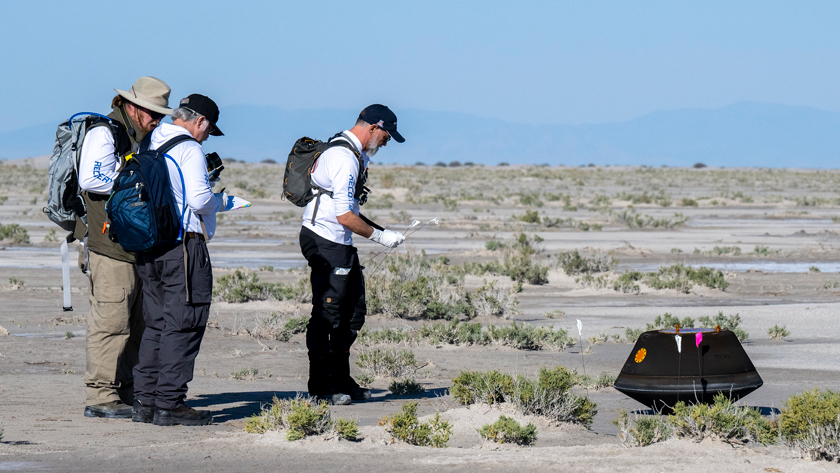
NASA/Keegan Barber
OSIRIS-REx Sample Return, September 24
L to R: NASA astromaterials curator Francis McCubbin, NASA sample return capsule science lead Scott Sandford, and
University of Arizona OSIRIS-REx principal investigator Dante Lauretta, beside the OSIRIS-REx sample return capsule
containing a sample collected from the asteroid Bennu in October 2020.
Lauretta: "Boy, did we stick that landing. It was just sitting right there, a few tens of feet right off a nice road,
a perfect place for the helicopters to land. It didn't move, it didn't roll, it didn't bounce,
it just made a tiny little divot in the Utah soil."
|
|

|
|
2023 September 24
Technofeudalism
Carole Cadwalladr
Yanis Varoufakis is the leftwing Greek firebrand who in 2015, at the height of the Greek debt crisis, was catapulted from academic obscurity to minister of finance.
His new book Technofeudalism says capitalism has been replaced with something worse. We are now in servitude to the fiefdoms of global masters like Mark Zuckerberg and Elon Musk.
YV: "Imagine .. a town full of people going about their business, trading in gadgets, clothes, shoes, books, songs, games and movies. At first everything looks normal. Until you begin to notice [that] all the shops, indeed every building, belongs to a chap called Jeff .. everything is intermediated by .. an algorithm that dances to Jeff's tune."
Jeff Bezos charges rent. This is feudalism. We're the serfs, but we don't even realise that our tweeting and posting is building value in these companies.
YV: "The people we think of as capitalists are just a vassal class now. If you're producing stuff .. you cannot become the ruler of the world anymore."
AR This is a development of an argument I presented in my 2010 book on Globorg. The new Big Tech bosses bestride the world like the robber barons of earlier capitalism.
The new ingredient is that a young hotshot with a brilliant idea can get venture capital so easily that getting started and selling shares to finance the growth of a big corporation is no longer the holdup. The crazy new idea is the precious pixie dust that gets the whole show on the road.
The result is technofeudalism, the oligarchy of the geeks. Next stop is the singularity, when one firm dominates the entire global economy and sets up an AI world.
|
|

Dorset for Europe
National Rejoin the EU march, London, Saturday September 23
|
|

|
|
2023 Autumnal Equinox
American Anarchy
John Gray
"Whoever succeeds in lodging themselves in the White House in January 2025 will preside over a failing state and a country descending into civil warfare. The hyperbolic liberalism of past decades will be locked in a deadly confrontation with the "populist" mass blowback that is its ever-present and lengthening shadow. The ensuing upheavals will not be pretty."
AR Gray is increasingly resembling a prophet of doom. This latest take on US political dysfunction is surely alarming, but it is surely too the plainest truth if Trump succeeds in getting re-elected.
|
|

|
|
2023 September 22
AI and Consciousness
Ed Prideaux
AI programs are not conscious. Neuroscientists can map the objective correlates of a conscious experience but not its irreducibly subjective dimension. This gap seems irreconcilable.
Materialists see the world as interacting physical entities. They depict consciousness as an emergent property. Their failure to explain consciousness has birthed a return of metaphysics.
The return is part of a revival of critiques of modernity in terms of meaning, religion, tradition, sex, and technology in media spaces. A focus on meaning merges consciousness and wellness.
Such ideological capture of consciousness and meaning reveals the limits of politics. Leftists dismiss spirituality and metaphysics as distractions from poor wages and failing public services.
The rising tide of AI increases the importance of consciousness. Seeing human beings as meat running wetware turns the mind into a commodity. Machines harvest our attention for profit.
Resistance to technological excess requires us to affirm attention and consciousness as sacred. Taking our conscious subjectivity seriously points us to a looming tech dystopia.
AR Take away the jargon terminology and this is still a sound philosophical critique of the societal impact of Big AI. All going well, I plan to tackle the theme in my next novel, due 2024/25.
|
|
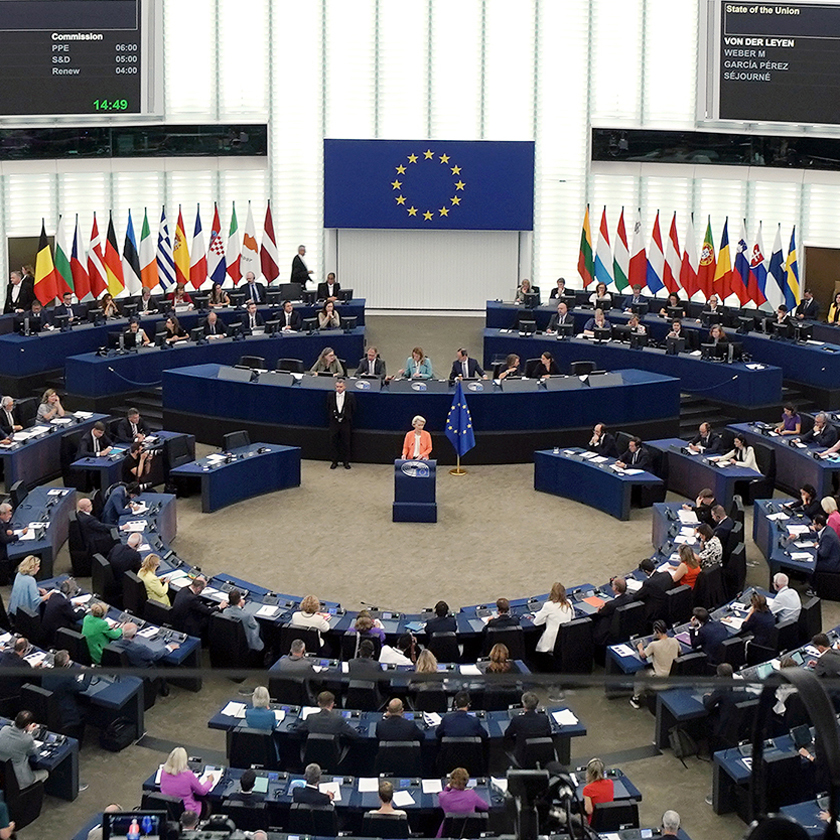
European Parliament
European Commission president Ursula von der Leyen: "It is our collective duty to write a new story for Europe.
The future of our continent depends on the choices we make today."
AR It is a monstrous absurdity that no British MEPs currently sit in this parliament.
Brits are effectively disenfranchised on their own continent.
|
|
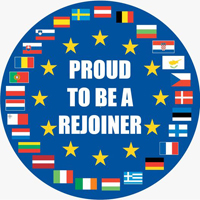
|
|
2023 September 21
Get Rejoin Done
Gina Miller
Brexit has had a negative impact across the UK:
✗ Three-quarters of British companies say the trade agreement between the EU and the UK has made it difficult for them to increase sales and grow their business.
✗ Across the NHS and social care, Brexit has compounded existing problems caused by a lack of workforce planning and poor conditions.
✗ UK business investment is slowing across every sector. Public services, retail and hospitality, and the entertainment industry all suffer staffing shortages linked to EU migration.
✗ Brexit is seriously harming the food and farming sector. Farmers are in despair.
✗ Alone, the UK will struggle to counter global threats such as climate change, data breaches, wars, terrorism, mass migration, and pandemics.
Rejoining the EU is now the will of people.
AR Pride drove the UK out of the EU following the referendum vote in 2016. Perhaps pride enough to accept the error of that choice without losing national self-respect can permit a return to the EU − the one organisation that offers a practical hope of providing a meaningful role for the UK into the foreseeable future.
2023 September 20
Rethinking Brexit
Rafael Behr
Brexit meant leaving the single market to give Britain a competitive edge. In reality, investors prefer the bigger market and expect regulatory compliance in the smaller one. The result is a gradual surrender of economic sovereignty.
Labour leader Keir Starmer wants to review the Brexit deal and upgrade it. But the single market comes as a package with free movement of labour, and aligning with European rules without a seat at the table looks like regulatory vassalage.
Starmer needs to rise above a commercial quid pro quo. The UK needs strategic realignment and institutional partnership with the European project.
EU protectionism weakens Germany
Wolfgang Münchau
An EU policy of tariffs on Chinese electric cars is protectionist.
A trade war with China is a nightmare for Germany. With Brexit, the Germans lost a major source of their trade surpluses. Then they lost Russia. Without China, their economic model will be broken.
A protectionist EU is focused on threat, not opportunity.
AR Without the UK in the EU to counter French dirigisme, Germany is being pushed against its mercantilist inclination. To ensure that reason prevails in EU policy debates, the UK must rejoin.
Accepting the euro, free movement, and European political infighting is a small price to pay for keeping Europe strong enough to flourish in a changing world.
|
|

|
|
2023 September 19
Happiness
Emma Beddington
Matthieu Ricard wrote a book called Happiness. He says it comes from ridding yourself of sources of suffering. It is "a sort of bonus" that comes from compassion, benevolence, and altruism.
Ricard, 77, combines the rigour of a French intellectual with the wisdom of intense spiritual practice. He was called "the world's happiest man" after a 2004 research project analyzed his brain as he meditated on compassion. His gamma waves showed high wellbeing and focus.
Happiness came out 20 years ago. His latest book, Notebooks of a Wandering Monk, is about his life. He relates a personal as well as a spiritual journey, working with the Dalai Lama and speaking at Davos and the UN and collaborating with scientists on the neuroscience of meditation.
Ricard grew up in France. His mother, Yahne le Toumelin, was a pioneering abstract painter. His father, the journalist and philosopher Jean‑François Revel, was a member of the Académie Française. Ricard was bewildered to see no correlation between genius and being a good person.
He says he was "born on 12 June 1967" at age 21 when he met his first teacher, Kangyur Rinpoche. He gave up a postgraduate position at the Institut Pasteur, said goodbye to the colonic bacteria that were the subject of his doctorate, moved to Darjeeling, and became a monk.
He collaborated with his father in 1997 on the book The Monk and the Philosopher. The philosophical dialogue was a near-instant bestseller. Overwhelmed, he talked to one of his teachers, who advised him: "Accept everything."
Ricard on the cult of secular mindfulness: "The Dalai Lama has said it's very simplistic .. If something becomes popular, it's unavoidable .. If a tool is useful, it is useful."
AR Ricard is an admirable figure. A friend at SAP introduced me to Happiness many years ago. More recently, I read Ricard's book Altruism with great pleasure.
|
|

|
|
2023 September 18
Britain Without Brexit
Anoosh Chakelian
Imagine an alternative UK with economic growth 5% higher than now, foreign investment 11% higher, and 7% more goods traded across its borders.
Referenced by the FT, Economist, and BBC, pondered in Whitehall and across Europe, this model may be the best analysis we have of Brexit's impact on the UK economy. It found Brexit had cut UK GDP by 5.5%, but when GDP growth was revised upward last month, the cut fell to 5%.
John Springford is the economist behind it. With data from 2009 Q1 to 2016 Q2, he used a weighted combination of advanced economies on a similar trajectory to predict a UK economy that stayed in the EU. He ran his model from 2018, making the code public to get feedback.
Springford: "The model suggests the costs of Brexit are on the higher end of the forecasts made before and immediately after the referendum."
AR Given the economic pain so many Brits now endure and given the expert warnings in advance, government pursuit of Brexit appears now as a criminally reckless policy. The politicians who pushed and promoted the policy should be banished from public life.
2023 September 17
Primal World Beliefs
Jer Clifton, Nick Kerry
Liberals and conservatives have deep disagreements about the nature of the world. Primal world beliefs may help explain their political differences.
Humans vary on 26 primal world beliefs. Around the general belief that the world is a dangerous place, liberals and conservatives agree in three ways and slightly disagree in three ways. Liberals see the world as more dangerous with respect to injustice.
Liberals and conservatives differ mainly over the belief that hierarchy is part of the natural order. People who see the world as hierarchical think almost everything in the world can be ranked from better to worse. Things of more value are distinct from things with less.
Conservatives tend to see the world as a place where observable differences reflect real underlying value that is somehow meant to be, where station and attention received are usually deserved, so most hierarchies that emerge are best left as they are. But change is slowly eroding the world's hierarchies, so constraining change and accepting inequality makes sense.
Liberals tend to see the world as a place where observable differences are superficial, rarely reflecting actual value, cosmic purpose or intent, deserved status, or attention received, so most hierarchies require reform. But the world is getting better and change is taking us in the right direction, so embracing change and rejecting inequality makes sense.
The main worldview difference between liberals and conservatives is whether the world is a place where differences should be respected.
AR The isolation of exactly 26 primal world beliefs strikes me as the kind of ill-motivated reification for which psychologists are notorious. Still, the general point about hierarchy is well taken.
|
|

MR
My youngest nephew Mike
fought again tonight.
He won, first round KO:
13 fights, 13 wins
|
|
2023 September 16
Pax Americana Redux
Michael Lind
Pax Americana was looser than an empire but tighter than an alliance. In the Cold War division of labor within Pax Americana, the US made wars and Japan and Germany made cars.
After the Cold War, instead of dissolving Pax Americana, the US establishment sought to globalize it. This was motivated in part by US fear of watching Japan and Germany re‑emerge as great powers.
Western governments expanded immigration. Neoliberal economists and libertarian ideologues said offshoring and the new immigrant proletariat had no big effects on wages and living standards.
Champions of globalization promised workers jobs in the knowledge economy. But the elites tried to force economic growth by asset inflation and immigration-driven growth. The rich got richer.
Economic elites welcomed immigration. But this created populist backlashes. Building a firewall against populist influence on public policy may create a version of China's social credit system.
Great power rivalry is back. At the global level, the attempt to universalize Pax Americana failed in 2008. Russia and China rejected the US offer to specialize in commerce like Japan and Germany.
Cold War 2 pits the West against China and Russia, but it will not be a rerun of Cold War 1. China has far more industrial power and latent military strength than the USSR possessed at its height.
In Cold War 1, Moscow and Beijing competed to lead the revolutionary religion of Marxism−Leninism. Today's Russia and China are conventional authoritarian dictatorships.
Cold War 2 has strengthened rather than weakened America's informal empire. In Europe and littoral East Asia, Pax Americana lives on.
AR Pax Americana lives on as a high-tech club, spreading the benefits of Alphabet, Amazon, Apple, Facebook, Intel, Microsoft, Tesla, and all the other big beasts of the corporate jungle, to a world hungry for the crumbs that fall from the Big Tech table.
This high-tech ecosystem is inherently globalizing, independently of the political shenanigans of techno-illiterate nationalist elites, and will prevail as soon as the futile posturing of Cold War 2 becomes obvious even to political blockheads.
The rise and rise of AI and its enabling and empowering technologies (such as robotics and biotech) plus the global imperative of climate change and its consequences (such as resource wars and mass migration) will force the pace.
|
|

Headline
Mount Theresa erupts on the erosion of trust in UK politicians and public institutions
Andrew Marr on May on Brexit: "Her case is that hardline Remainers .. and hardcore Brexiteers .. jointly wrecked
the possibility of a deal that would have honoured the vote but allowed trade to continue relatively freely."
|
|

|
|
2023 September 15
Plutocratic Britain
George Monbiot
"Almost everyone in [UK] public life accepts the same set of preposterous beliefs. That economic growth can continue indefinitely on a finite planet; that the unhindered acquisition of enormous fortunes by a few is acceptable, even commendable; that they should be allowed to own as much natural wealth as their money permits; that there's nothing objectionable about a few offshore billionaires owning the media and setting the political agenda; that anyone who disputes such notions has no place in civil society."
AR Wow! That's quite a charge sheet. Yet there's a lot of truth there. I would dispute this or that detail, but I must admit I see an incendiary indictment there even when the hyperbole has been cut down to size. The British governing elite has a lot to answer for.
|
|

|
|
2023 September 14
Earth Beyond Boundaries
Katherine Richardson et al
The planetary boundaries framework suggests Earth is now well outside the safe operating space for humanity. Earth system modeling illustrates that anthropogenic impacts on Earth must be considered in a systemic context.
The framework identifies nine processes maintaining the stability and resilience of the Earth system. All are presently heavily perturbed by human activities. The framework sets levels of anthropogenic perturbation that allow Earth to remain in a state similar to that of the past 10 ky or so rather than changing into a state without analog in human history.
Human activities have now brought Earth outside of the Holocene window of variability, giving rise to the Anthropocene epoch. The planetary boundaries framework delineates the systems and processes known to regulate the state of the planet within ranges conducive to the human welfare and societal development experienced during the Holocene.
Planetary boundaries bring a scientific understanding that identifies a safe operating space for humanity. The Holocene state of Earth is the benchmark reference. Earth is in danger of leaving its Holocene-like state.
AR As usual, the science of this topic is alarming, but no one seems capable of effective action. We need politicians worldwide to agree to take a global perspective and work together on the climate emergency. Otherwise, what merit can the larger political structures of this world claim to have?
|
|
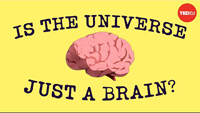
|
|
2023 September 13
Entanglement Entropy
Charlie Wood
Quantum entanglement naturally spreads through grouped particles, weaving a web of contingencies. By measuring the particles often enough, we can break entanglement and stop the web from forming. The change is like a phase transition.
Imagine an entangled pair of particles A and B, each with spin that can be measured as up or down. They begin in a superposition. If we find B pointing up, measuring A will find it pointing down. Measuring one particle tells us about the other.
Entanglement entropy (in bits) says how much a measurement of B reduces ignorance about A. No entanglement entropy means measuring B says nothing about A. High entanglement entropy means measuring B says a lot about A.
Imagine a long chain of particles. Entanglement jumps from one particle to the next. To see how far entanglement has taken hold, label one half of the chain A and the other half B; if entanglement entropy is high, the two halves are highly entangled.
Left untouched, the quantum state of a group of particles reflects all the possible combinations of ups and downs we can get when we measure those particles. But measurement collapses a quantum state and destroys its entanglements.
Random interactions between the particles complicate the state of the chain over time, spreading out its information. The chain effectively hides information from measurements and allows much of its entanglement to escape collapse.
A measurement-induced phase transition is a transition between information phases, one where information remains spread out and one where it is localized by repeated measurements. Measurement changes the web of information.
AR Entanglement entropy suggests to me that we should completely rethink the concept of entropy to give it a foundation in quantum rather than classical mechanics.
As I understand it, entanglement entropy leads to a massive reduction of classical microstates accessible to a quantum system. Recall the holographic principle, where the number of microstates scales with the area bounding a volume, not classically with the volume.
The new concept will have dramatic consequences in cosmology, where the idea that the universe began in a state of extremely low entropy (Roger Penrose guesstimates it as 10 to the power −123) is essential to explain the thermodynamic arrow of time.
The idea that the universe will fizzle out in a heat death also becomes dubious. Boltzmann brains and the like fall away too. Scope for cosmic optimism!
|
|

|
|
2023 September 12
Britain Must Change
Andrew Marr
A storm is coming. The UK economy is too small to deliver the social goods British people expect.
A radical rethink of UK relations with the EU cannot be long avoided. A further Tory government would again be held hostage by Brexiteer extremists. The election of Labour in 2024 would mean five more years of atrophying UK−EU relationships.
We need to look again at wealth taxes, in view of the huge asset bubble that followed the BoE's QE experiment. The unfairness in the current system cannot be ignored. Like Brexit, this will involve a future Labour government in great and bitter controversy.
Things outside a future British government's control will massively shape the decade ahead. A second Trump presidency would hugely endanger European security. It would end the American century of global dominance, with consequences for the UK.
Artificial intelligence will have huge political consequences. Among the jobs likely to go early on, the most at risk include lawyers, professors, teachers, judges, financial advisers, estate agents, bank workers, psychologists, and HR and PR workers.
The UK will need a strong and decisive state. We may see fundamental changes.
AR We should not underestimate the British predilection for muddling through despite a crying need for radical change. The crisis has a while to gather volume before the pips squeak enough to deliver revolutionary upheaval.
|
|

|
|
2023 September 11
Meditation
Annaka Harris
Meditation can cause people to feel at one with the universe and more connected to other people. The illusory sense of being a self is related to the feeling of freedom of will. When the dual sense of self and free will drops out, people report a deep feeling of wellbeing.
The brain is complex. All the factors leading up to any decision contribute to even the smallest decisions. But even though the brain, as a system, is capable of an uncountable number of sequences of behaviors, it's not capable of all those behaviors in every moment in time.
The dance of electrical firing in the brain is in constant dialog with the outside world and other beings. Breaking through the illusions of self and free will can help us feel at one with the rest of nature. We glimpse the mystery of being an integral part of the universe.
AR The sense that we have free will is invincible so long as the sense of self persists. I can act, and I feel the sense of freedom to act, ideally to act any way I want. But I'm not free to choose what I want; that's determined by our causal nexus.
I know what I can do, but not what I can't do. My self is constructed from what I know. Any intelligent system faces the same epistemic limit. This may be a derivable consequence of the self-referential bounds of a computational system.
2023 September 10
Mindfulness
Nadine Levy
Mindfulness encourages the conscious exploration of meaning in our lives. It can help us to develop a gentle, responsive, and inquisitive approach to ourselves and others. This can lead to greater clarity about how our daily decisions align with our deepest intentions.
By using mindfulness to see what is really there, we become more empowered to make choices that support a state of ease, clarity, and purpose. Once we are in a balanced state of mind, mindfulness can help us to get in touch with intuitive and bodily ways of knowing.
One way to access such embodied insight is by developing an awareness of bodily sensations. Another way is to engage in mindful inquiry and active contemplation. We can move beyond the sense of our little lives into something that connects us to our shared humanity.
Mindfulness can give us the tools to bring awareness to the daily choices we make. As our practice deepens, we can better access our embodied and intuitive sense of our passions and interests and how we might use them to live our lives.
AR I find the practice beneficial, although I don't do it methodically but simply follow instincts I've learnt not to ignore or dismiss. A benefit of having studied philosophy is understanding the practice and taking it seriously.
2023 September 9
Quantum Biology
Clarice Aiello
There is a protein that senses magnetic fields through a spin-dependent chemical reaction.
Electrons possess spin, and different spin states interact differently with magnetic fields. A magnetic field can put a particle's spin in a superposition of up and down.
Some chemical reactions are influenced by the superposition states of specific electron spins. Magnetic fields can affect the macroscopic outcomes of these reactions.
The protein interacts with very tiny magnetic fields using electron spin as a quantum detector. And it does so at room temperature, in a messy solution with millions of molecules.
Electron spin-dependent chemical reactions can alter the function of living cells. Birds can sense Earth's magnetic field as a migratory cue. They seem to do so via the protein cryptochrome.
There is evidence that weak magnetic fields lead to physiological responses across the tree of life. The effects range from changes in DNA repair rates to neurological function and cell metabolism.
A revolution in our understanding of biology and the role of quantum physics is coming.
AR Totally agree. I talked with Johnjoe McFadden about this at a gig in Prague in 2003, before he and Jim A-Khalili published Life at the Edge: The Coming of Age of Quantum Biology (2014).
|
|

Taylor Swift
|
|
2023 September 8
Taylor Swift
Shaad D'Souza
Taylor Swift has just wrapped up the first leg of the Eras tour. When it concludes in November 2024, the tour will have grossed an estimated $1.4 billion in revenue.
Swift is the most successful pop star in the world. In 2020, she dropped two albums that repositioned her as a serious musician, not just a pop star. She will soon release the album 1989 (Taylor's Version), a re-recording of her album 1989, originally released in 2014.
Back then, there was no way to be a megastar pop icon without blanket media coverage. Today there is less of a monoculture. The social media ecosystem has spawned celebrities who are hugely famous to those who are interested but largely unknown to those who are not.
Pop Pantheon host Louis Mandelbaum: "We're in the era of everyone being a cult star .. all Taylor has to do is play into what her fans want from her."
Swift can now be famous to those who love her, yet free from the hate that hit her in 2016. Her songs remain heavily played on legacy platforms such as pop radio, but a constant drip feed of new music is being uploaded to streaming services. Swift had four albums in the US Top 10 at once this summer.
Mandelbaum: "She has achieved so much through her own merits and talent and vision .. there are just so many people that love her."
AR A wonderful story, a legend for our time. In my humble opinion, she's a great artist. I have several of her recent albums (on the antique medium of CDs).
|
|

|
|
2023 September 7
UK Rejoins Horizon Europe
Lisa O'Carroll
UK prime minister Rishi Sunak has confirmed that the UK will return to the Horizon Europe science research programme. The UK will also rejoin the Copernicus Earth observation satellite programme. But the UK will not rejoin Euratom and will instead pursue a domestic fusion energy strategy. The UK will contribute about €3 billion on average a year to Horizon and Copernicus.
Royal Society president Sir Adrian Smith: "Fantastic news not just for the UK but for scientists across the EU and for all the people of Europe."
AR Good news indeed − the best from the present UK government for a lamentably long time.
Alien Visitors?
Alexandra Witze
Researchers claim to have collected fragments of a meteorite that came from beyond our solar system. But the evidence that the material came from another solar system is not convincing.
In 2017, an object flew past the Sun on an orbit that extended beyond the solar system. The object, Oumuamua, was the size of a skyscraper. A second such big object, Borisov, was seen two years later. These are the only two confirmed interstellar objects so far.
An estimated quadrillion interstellar objects occupy the cubic parsec of space around the Sun. One of them can get a gravitational kick that flings it through our solar system. If it were big enough to see, its hyperbolic orbit would reveal it as an interstellar visitor.
Avi Loeb claims his team has found hundreds of tiny metallic balls on the sea floor off the coast of Papua New Guinea that he says are from an interstellar meteorite that hit Earth in 2014. Others say the flash seen in 2014 may not have been from an interstellar object.
Several of the balls are unusually rich in trace elements Be, La, and U. But these abundances are not the best evidence of interstellar origin. Better to check O isotopes in the balls.
AR I'm skeptical about Loeb's new claim. He made big claims about Oumuamua, too, saying it might be an alien spaceship, but few other people went along with that one. As we often say, extraordinary claims require extraordinary evidence. His evidence on Oumuamua seemed thin. Now his evidence on the balls seems weak.
|
|

JL Austin
|
|
2023 September 6
Invasion of the Martians
Thomas Nagel
John Langshaw Austin was the leading figure of the school of ordinary language philosophy that dominated Oxford for decades after WW2. During the war, he had been a military intelligence officer. He died in 1960 at the age of 48.
Austin was elected a prize fellow of All Souls in 1933. After two years there, he took a job at Magdalen College and gradually found his way in philosophy. Wittgenstein was a major influence. Austin gave a talk on the meaning of words at Cambridge in February 1940.
He was called up in July 1940. He worked in MI14 and generated the intelligence that the Germans were moving into North Africa in force. But by the time of the battle at El Alamein in 1942, he was head of the Advanced Intelligence Section of General Headquarters.
The group was known informally as the Martians. They produced a set of books for officers with detailed local information and maps for the D-Day invasion of Normandy in 1944. Austin rose to the rank of lieutenant colonel before returning to Oxford in 1945.
Austin developed an ordinary language philosophy. He said natural language embodied the collective wisdom of generations of practical engagement with the world. He marshalled a study group of dons and inspired a generation of Oxford philosophers.
Careful attention to language remains a valuable tool of analytic philosophy.
AR I read Austin early on at Oxford, but he wasn't really my style. I preferred direct engagement with the big issues, with the formalised languages of logic and mathematics as my guide.
|
|

|
|
2023 September 5
UK Tax Injustice
Harry Lambert
The British tax system punishes work at the expense of wealth and poorer homeowners at the expense of richer ones. The very richest sit on vast estates and pay lower rates of tax than the staff they employ.
Since 2010, the Bank of England has used quantitative easing (QE) as its primary policy tool. QE has fueled an enormous asset boom. Alleviating the effects of QE is delegated to the Treasury.
Assets are taxed far more favorably than labor in the UK. The return on capital has shot up since 1980, and inequality has risen with it. The UK tax system entrenches inequality.
Council tax imposes a far greater proportionate burden on the poor. Every property owner in the UK could instead pay 0.5% on the value of their home. To raise fresh revenues, apply National Insurance to landlords and speculators and reverse the 2016 capital gains tax cut.
Britain's inheritance tax system is riddled with asset reliefs and trust exceptions. Those with the greatest estates pay the lowest rates. Labour should impose a wealth tax.
AR The UK tax system certainly fails to deliver the distributive justice often touted as a major feature of the system, and of income tax in particular. A parliamentary committee should be appointed to conduct a comprehensive review and recommend radical reforms. Trust the next Labour government not to appoint one.
|
|

|
|
2023 September 4
Complexity Theory
Ben Brubaker
The central open question in computer science is the P vs NP problem. The problem arises from sorting computational problems into complexity classes, such as P and NP.
P problems can be solved in polynomial time. NP problems have easily checkable solutions. Problems in P are also in NP, but some NP problems seem harder.
Kurt Gödel proved that a statement like "This statement is unprovable" can be derived from any appropriate set of axioms. If such a statement is unprovable, the theory is incomplete; if it is provable, the theory is inconsistent.
Alan Turing made a mathematical model to represent all possible algorithms, and then used Gödel's method to prove the existence of uncomputable problems. His distinction between computable and uncomputable problems did not distinguish P from NP.
Claude Shannon showed how switching circuits can represent logical expressions involving Boolean variables (1 or 0) linked together by the logic gates AND, OR, and NOT. A Boolean function takes in Boolean variables and outputs either 1 or 0. With enough of these gates, you can perform any computation.
The circuit complexity of a function is the total number of gates in the smallest circuit that computes it. The minimum number of gates needed to compute a Boolean function can grow polynomially or exponentially as the number of input variables increases. Like P or NP problems, Boolean functions can be easy or hard.
Encryption methods used today are based on NP problems. To ensure these methods are secure, you need to prove that P ≠ NP. Early attempts to prove P ≠ NP had a self-defeating character like Gödel's unprovable statement, suggesting a barrier.
A natural proofs barrier distinguishes high-complexity functions from low-complexity ones. It is like distinguishing true randomness from the pseudo-randomness used to encrypt messages. For secure cryptography, we want pseudo-randomness to be indistinguishable from randomness.
The list of outputs of a hard Boolean function is indistinguishable from a random binary string. For an easy function, the string must have a short description. For a pseudorandom string used in cryptography, the short description is the secret message.
A natural proof of P ≠ NP would yield a fast algorithm that could distinguish pseudorandom strings containing hidden messages from truly random ones. If secure cryptography is possible, natural proofs cannot prove P ≠ NP.
AR The source document here is huge, so this is a highly selective précis that stops short of the more intriguing recent work on the leading edge. But, hey, my brain is taxed by this stuff already. Loading these notes down with dizzying detail helps no one.
|
|

AR
Bournemouth air show, last day, just in time before a "heat wave" week
|
|

|
|
2023 September 3
Blasphemy and Bigotry
Kenan Malik
The Danish government aims to ban the "improper treatment of objects of significant religious importance to a religious community" in a new law.
Any law outlawing blasphemy is unacceptable. The charge of blasphemy helps to shore up the power of religious leaders and institutions and to silence critics and dissenters.
In defending freedom of religion and speech, we must also oppose anti-Muslim bigotry. Such bigotry is often expressed through denying the right of Muslims to practise their faith. We must oppose restrictions on freedom of religion.
Taboos help maintain coercive power relations within Muslim communities. Those fighting repression imposed in the name of Islam may burn Qur'ans to challenge them.
To oppose restrictions on blasphemy, we must also stand against bigotry.
AR This is a counsel of perfection. Politically incorrect speech is like secular blasphemy, excessive disrespect of a person is like personal blasphemy, and political commentary can border on ideological bigotry. Religions deserve no free pass here, true, but burning Qur'ans has unintended consequences, such as delaying Sweden's accession to NATO, so we need to tread carefully.
|
|
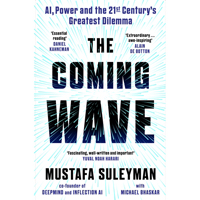
|
|
2023 September 2
AI: The Coming Wave
Mustafa Suleyman
We're at a moment with the development of AI where we have ways to provide support, encouragement, affirmation, coaching, and advice. We've basically taken emotional intelligence and distilled it. This is going to unlock the creativity of millions and millions of people.
Biotech is already undergoing its own transformation, but AI will act as a potent accelerant. Manufactured products could one day be grown from synthetic biological materials rather than assembled, using carbon sucked out of the atmosphere. Organisms will soon be designed and produced with the precision and scale of today's computer chips and software.
Four aspects of the AI revolution create the potential for catastrophe:
▵ AI has asymmetric effects. A rag-tag band of fighters can hamstring a powerful state using guerrilla tactics. An anonymous hacker can bring down a healthcare system's computers.
▵ AI can refine design and manufacturing processes, with the improvements compounding after each new iteration. Lethal threats could emerge and spread before anyone has even clocked them.
▵ AI will permeate all aspect of our lives. It brings benefits, but it also enables harms. The good will be too tempting to forgo, and the bad will come along with it.
▵ AI has the potential to make decisions for itself. Though this may invoke Terminator-style nightmares, autonomous cars are likely to be much safer than ones driven by humans.
I see technological change as arising from the collective creative consciousness. Very rarely does an invention get held in a private space for very long. Our business plan had the mission to build artificial general intelligence safely and ethically for the benefit of everyone.
AR Suleyman should be a good thought leader on this topic. I see no reason to disagree with his basic perspective here. The potential of AI is both good and bad, with both sides exceeding the bounds reached by previous new technologies. We live in interesting times!
|
|

|
|
2023 September 1
Mathematical Proof, Social Compact
Andrew Granville
Mathematics is an experimental process. The culture of mathematics is all about proof. The main point of a proof is to persuade the reader of the truth of an assertion.
Verification is key. The best verification system we have in mathematics is that lots of people look at a proof from different perspectives, and it fits well in a context they know and believe. Proofs are accepted by these community standards.
The notion of objectivity is important in mathematics. But we're entrapped in our society. We have no outside perspective to say what assumptions we're making.
Aristotle proposed a deductive system going back to certain axioms. But the Euclidean axiomatic system that developed had its problems. Bertrand Russell and Alfred Whitehead tried to create a new system of doing math. But it was ludicrously complicated, and nobody was comfortable with it.
David Hilbert proposed that you cannot deduce two things from your axioms that contradict each other, and you should be able to do most math in terms of the selected axioms. We can resolve statements that cannot be proved using ZFC either way, because we can choose our axiomatic system. Kurt Gödel proved that no matter how we select our language, there are always statements in that language that are true but that cannot be proved from our starting axioms.
Alan Turing said a computer is designed to do what humans can do, just faster. We have been using computers to make calculations for decades. Today we can use AI to verify what we believe to be true. But proof verification seems no more secure than most things done by humans.
Our future will rely on the sense of community we have relied on throughout the history of science. We bounce ideas off one another, we talk to people with different views, and so on.
AR As an Oxford philosopher, I studied the issues around ZFC, Gödel's theorems, and Turing's work in depth, motivated by Wittgenstein's skeptical views on mathematical objectivity. The outcome was very like the view Granville sketches here. As Robert Brandom has since shown, Hegel had already prefigured the general issue about meaning.
|
|

AR
Bournemouth Air Shows 2023 kicks off with the Red Arrows (center)
|
|
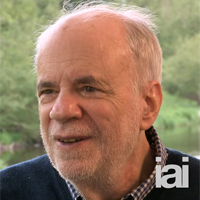
Saul Kripke
On Kripkenstein
|
|
2023 August 31
Oxford Philosophy
Michael Gibson
In 1963, the philosophers Gilbert Ryle and Isaiah Berlin had lunch with the composer Igor Stravinsky. Ryle was scathing in his survey of the philosophical landscape, summed up in his Oxonian putdown: "Every generation or so philosophical progress is set back by the appearance of a genius."
By the 1950s Oxford had ascended to a commanding position in philosophy in the English-speaking world. On the European continent, philosophers ran headlong down another path. The two broad traditions are known as analytic and continental philosophy. The gap between them is vast.
The analytic tradition is mainly Anglo-American. It began at Oxford in the 1920s. It would build on the formal power of mathematical logic and the undeniable success of science to develop a new method for reaching the truth about great questions.
Oxford led the way, and the rest of the Anglosphere followed. Its legacy is a devotion to rigor, clarity, truth, and no nonsense. After ancient Athens and Renaissance Florence came postwar Oxford. Four factors:
✓ The philosophers had to pass through the eye of an academic needle. Many had achieved top marks in the study of Greats. This weeded out the lazy, the sloppy, and the unexceptional.
✓ Oxford has always relied on the use of one-on-one or one-on-two tutoring as its primary mode of instruction. Such tutoring far surpasses any other form of instruction.
✓ Most of the philosophers did not have doctoral degrees in philosophy. Social and intellectual influences outside the tutorials became crucibles for refining thought and sharing a vision.
✓ A few of these misfits went to extremes of obsession and single-mindedness. They believed philosophy was a non-natural science like mathematics, only less developed, with worse tools.
Analytic philosophy is now exhausted. American philosophers picked up where Oxford left off and carried the torch further, but with advances measured in inches, not miles. In the wider public debate, analytic philosophers have lost out to continental philosophers. Today, the very idea of truth is up for grabs, not least in the media.
AR I was there during the later Golden Years, imbibing the spirit, drinking the Kool-Aid. Ryle's "genius" was Wittgenstein, whose star shone bright during my stay but whose brilliance has survived mainly in the portmanteau figure of Kripkenstein. For me now, the German era from Kant to Hegel follows Athens and Florence in the all-star ranking.
|
|

|
|
2023 August 30
Quangled Spacetime
Vijay Balasubramanian
A classical hyperbolic space with gravity can be seen as equivalent to a lower-dimensional quantum world without gravity. This AdS/CFT duality opens the possibility that space is emergent.
Quantum mechanics says information cannot be destroyed. But information seems to be destroyed as a black hole evaporates. And the entropy of a black hole equals its surface area. Something links area, entropy, and information.
Consider how the bulk space in an AdS universe looks on the boundary. If two regions in space are connected, then in the flat-world boundary the corresponding variables are quangled. Measuring one tells us about the other: No quanglement, no space.
From our perspective, A and B are connected in space if we can draw a smooth line between them. But a tiny region of space, like everything in the quantum world, is fluctuating like crazy. We must open our minds to more subtle ideas of space.
Consider the entanglement of two gravitating universes. If the two universes are disjoint, general relativity requires that they be completely severed, with zero paths from A to B. But what if the wild fluctuations of quantum gravity make fleeting connections?
A bubble of nothing in space occurs when the degrees of freedom in the dual flat world are not entangled in the right way to make a space. The bubble still contains information.
AR Treat these as working notes but no more. I'm persuaded by the basic idea here, but I have no idea whether it can be worked out with full mathematical clarity. Quangled qubits are key to the structure of spacetime − I guess that's the takeaway message.
2023 August 29
AI Consciousness
Mariana Lenharo
Since the introduction of advanced chatbots, we need new methodologies to assess the capabilities of such AI models. We need a checklist of criteria to indicate that an AI system has a chance of being conscious. The companies building the systems are not testing them for consciousness.
Defining what it means to be conscious is a challenge. Phenomenal consciousness is the experience of being embodied. Functional consciousness relates to how systems process information. No existing AI system is a strong candidate for consciousness in either sense.
AR Dan Dennett's view of consciousness as a term of folk psychology that we apply to a system based on how far we adopt the intentional stance toward that system might be a good starting point. This boils down to saying we'll know when we see it.
In the absence of an agreed technical definition of consciousness, Dennett's perspective seem to me to be the best we can adopt. People will disagree over attributions of consciousness. So far, it's a term of art, not science.
|
|
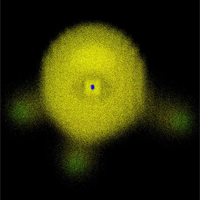
⊛ Mario Barbatti
Clouds in NH3 molecule:
electron cloud yellow,
N nuclear cloud blue,
H protons green
|
|
2023 August 28
Quantum Chemistry
Mario Barbatti
Quantum theory describes molecules, atoms, and subatomic particles. Left to themselves, they fuzz out as delocalized waves in clouds. When they are probed, they pop out as localized particles.
A molecule is a stable collection of nuclei and electrons. A collection with a single nucleus is an atom. Electrons have negative electric charge. A nucleus has several protons and neutrons, each much more massive than an electron. Protons have positive charge, neutrons no charge. A molecule with equal numbers of protons and electrons is neutral.
Protons and neutrons are like tiny pots of hot soup. Each pot has three quarks boiling among countless virtual quarks and gluons popping in and out of existence within a radius of 0.9 fm. The nucleons are bound in place by the exchange of short-lived pions. A nitrogen nucleus has 7 protons and 7 neutrons and a radius of about 3 fm. The radius of an N atom is 179 pm.
By uncertainty, a quantum particle cannot have a precise position and a precise speed at the same time. By exclusion, no two similar fermions can be in the same space with the same spin at the same time. Nuclei and electrons delocalize in clouds due to uncertainty, and electrons fuzz out into different clouds due to exclusion.
Quantum theory describes the clouds by a wave function that assigns a changing amplitude to every point in space. The modulus of the squared amplitude at a point gives the probability of finding the particle there.
The clouds explain chemical bonds in molecules. When atoms bump into each other, their outer electrons repel. The clouds of nuclei and electrons remain still for a molecule with a defined energy. When molecules meet in a chemical reaction, a storm rages for less than 1 ps until calm returns.
Quantum theory depicts a strange and alien world.
AR The full essay includes more charming details. The quantum world has been my frenemy for decades and still boggles my imagination.
|
|

|
|
2023 August 27
The Scientific Consensus
David Robert Grimes
Science is an active and systematic method of inquiry. Its testable predictions are updated as new findings emerge, to reflect the totality of evidence. Scientific positions are always transient, subject to revision when stronger evidence emerges. All scientific knowledge is provisional.
Scientists are people, susceptible to the same human flaws, biases and dishonest conduct as anyone else. Any perceived insight that an individual scientist has stems entirely on them accurately reflecting the totality of evidence. Scientists who fail to do this are no longer doing science.
A false aura of scientific respectability bamboozles the unwary. A minority of individual scientists can and do make assertions contrary to best evidence. As scientists are among the most trusted members of society, they do damage when they champion positions without evidence.
There is a difference between the opinions of individual scientists and the collective consensus of scientific authorities. Scientific bodies assess all available evidence to arrive at an informed position. The resultant scientific consensus is far more robust than individual positions.
Republican candidates last week denied the reality of anthropogenic climate breakdown. Some decried it as a hoax by scientists. Such comments serve only to undermine public trust and understanding, leaving us more divided and less informed.
AR This strikes me as an excellent summary of the strengths and status of science and the scientific method. Too many politicians seem ignorant of science in this sense, leaving them scientifically illiterate and hence unworthy of public office.
2023 August 26
Theories of Consciousness
Elizabeth Finkel
In 2018, the Templeton World Charity Foundation kicked off a multiyear project to test theories of consciousness. The proposed tests pitted global neuronal workspace theory (GNWT) against integrated information theory (IIT):
◼ GNWT says a subset of the information we process unconsciously is selected to pass through a bottleneck into a conscious workspace. The information is integrated and broadcast to other brain areas to make it globally available. The prefrontal cortex is deemed crucial.
◼ IIT arose from five axioms: Consciousness is intrinsic to the entity who has it; its composition is structured; it is information-rich; it is integrated rather than reducible to components; and it is exclusive of other experiences. The axioms suggest a "hot zone" neural architecture.
The Templeton experiments were designed and performed to test the predictions of IIT and GNWT. The results were announced at ASSC 26 in June 2023. There was no winner.
AR This is the latest report on a contest and a topic I've covered regularly over the years. I remain unpersuaded by either of the theories. Both share a focus on the brain as the locus of first-person (1P) experience, whereas I think a fuller study of the emergent features of complex neural networks − natural of artificial − will show our fixation on IP phenomenology to be irrelevant.
|
|
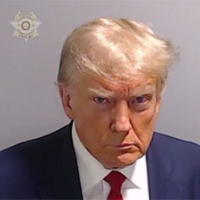
Fulton County Sheriff's Office
POTUS 47?
|
|
2023 August 25
Trump Surrenders
The Guardian
Donald Trump surrendered at the Fulton county jail on Thursday on racketeering and conspiracy charges over his efforts to overturn the 2020 election results in the state of Georgia.
The booking came during prime time for the news networks. Trump is said to have insisted on this in an effort to discredit the charges and distract from the indignity of the surrender.
Trump turned himself over without the special privileges afforded to him in his other criminal cases. He was processed as any criminal defendant and had his mugshot taken.
AR The impending Trump candidacy is a stress test for US federal institutions. If the America we know and love has any political future at all, it will find a persuasive way to get rid of him.
Colonizing Mars
Philip Ball
NASA: "Once the exclusive province of science fiction stories and films, the subject of space colonization has rapidly moved several steps closer to becoming a reality thanks to major advances in rocket propulsion and design, astronautics and astrophysics, robotics and medicine."
Why should we wish to dwell on a world that lacks what we need to survive? There is no Planet B, and to suggest otherwise risks lessening the urgency of preserving Planet A.
What might life in Mars City be like? Science fiction is full of grim outposts on bleak, frozen planets. If history is any guide, frontier settlements are no picnic.
Who gets to go? If these settlements would save us from catastrophe on Earth, it would likely be the rich and famous.
AR These questions are important. We should try not to blow trillions on a misconceived venture. But if an environmental apocalypse makes Earth well nigh uninhabitable, leaving a few rich guys in space may be better than total extinction.
|
|

|
|
2023 August 24
Building BRICS
Financial Times
The BRICS nations Brazil, Russia, India, China, and South Africa have invited Argentina, Egypt, Ethiopia, Iran, Saudi Arabia, and the UAE to join their emerging market group.
South African president Cyril Ramaphosa: "We value the interest of other countries in building a partnership with BRICS."
Indian PM Narendra Modi: "Adding new members will further strengthen BRICS and give it a new impetus."
The new members will increase the BRICS share of global GDP from 32% to 37% on a PPP basis.
AR This could become a serious power bloc − but not before it gets a new name, not one given it by economist Jim O'Neill, aka Baron O'Neill of Gatley.
Prigozhin Puzzle
The Guardian
German foreign minister Annalena Baerbock: "It is no accident that the world immediately looks at the Kremlin when a disgraced former confidant of Putin suddenly, literally falls from the sky two months after he attempted a mutiny. We know this pattern in Putin's Russia: deaths, dubious suicides, falls from windows, all which remain unclarified: That underlines a dictatorial power system that is built on violence."
Polish prime minister Mateusz Morawiecki: "The Wagner group comes under Putin's leadership. Let everyone answer the question for themselves: Will the threat be bigger or smaller? For me, that's a rhetorical question."
AR The mystery only serves to underscore the ugly truth of how disgusting and repulsive the Putin regime has become. Russians have only themselves to blame.
|
|

ISRO
Indian PM Narendra Modi:
"This is a victory cry of
a new India."
|
|
2023 August 23
Indian Moon Victory
The Times of India
India has landed a spacecraft near the Moon's south pole, an uncharted territory we believe holds reserves of frozen water and precious elements. A lander with a rover inside touched down on the lunar surface at 6:04 local time, sparking cheers and applause among the space scientists watching in the southern Indian city of Bengaluru. India is the first country to touch down near the south pole region and joins the United States, the Soviet Union, and China in achieving a lunar landing.
Astronomy professor R C Kapoor: "This is the best moment of my life and we can't express our excitement as it landed. This is the moment to congratulate ISRO, the whole nation and the entire world .. This opens the floodgates to research and increase activity in the Southern part of the Moon. India is now one of the four topmost space agencies of the world."
Union minister Sarbananda Sonowal: "I congratulate our scientists on this day. This is a golden opportunity for the youth, they should draw inspiration from this moment and work toward making India a developed nation."
Union minister Nityanand Rai: "It is a moment of pride for India and all Indians. It is the result of hard work done by ISRO scientists under the vision of PM Modi."
BJP leader Sudhanshu Trivedi: "This is an amazing and unprecedented moment. I want to thank our ISRO scientists and PM Modi for his motivational leadership."
Google CEO Sundar Pichai: "What an incredible moment! Congratulations to ISRO for the successful landing of Chandrayaan‑3 on the moon. Today India became the first country to successfully achieve a soft landing on the southern polar region of the moon."
AR Brilliant achievement! India has come of age as a technological nation. Exploring near the south pole contributes usefully to the international effort to make lunar exploration pay for itself in terms of supporting future lunar settlements and missions to other moons and planets.
|
|


University of Ottawa
Quangled photons
|
|
2023 August 22
China's Economy
Financial Times
China's leaders have vowed to address the "new difficulties and challenges" besetting the world's second-largest economy, opening the way for bolder government measures. But the People's Bank of China called for lenders to be allowed to make a "reasonable profit" as they unveiled smaller than expected reductions to core interest rates. Beijing needs to balance a desire to stimulate the stuttering economy with the need to preserve the stability of China's $56 trillion banking system.
Reduced growth prospects
CNN
In recent weeks, China's economic slowdown has alarmed international leaders and investors. Last week, the Chinese yuan fell to its lowest level in 16 years. After a spurt of activity earlier this year following the lifting of Covid lockdowns, growth is stalling. Consumer prices are falling, a real estate crisis is deepening, and exports are in a slump. Youth unemployment is so bad the government has stopped publishing the data. Several major investment banks have cut their forecasts of China's economic growth to below 5%.
Chinese economic slowdown
Kenneth Rogoff
China's current problems can be traced back to its massive post-2008 investment stimulus, much of which fueled the real estate construction boom. The property sector is now yielding diminishing returns. In 2013, even Harvard economist Lawrence Summers had advocated investment in infrastructure and education plus transfers from rich to poor.
AR This is ominous news. If the Chinese economy sneezes, we all catch a cold, to misquote an old saying. Even given China's support for Russia, we in the West cannot afford for China to lose its economic dynamism. Are we overdoing our "safe‑sourcing" efforts?
2023 August 21
AI Is Janky
Amba Kak
Artificial intelligence is a marketing term. Algorithms take large amounts of data, process that data, and generate outputs. These systems generate text, images, and voice outputs.
Vested interests want us to see them as being intelligent and a stepping stone to the singularity and artificial general intelligence. ChatGPT is the beginning. The end is we're all going to die.
These narratives are purposefully distracting. These systems are taking a ton of data from the web. They're learning patterns, spitting out outputs, replicating the learning data.
This is about data protection, data privacy, and competition policy. Generative AI is being used for spam, fraud, plagiarism, deepfakes, that kind of stuff. The companies need regulation.
These AI systems are janky. They're being gamed. They're being misused. They're inaccurate. They're spreading disinformation.
AR I agree: This problem is much more important right now than the fanciful notion that an AI system based on current architectures could stage a hostile takeover of the world and autonomously choose to exterminate humanity.
|
|
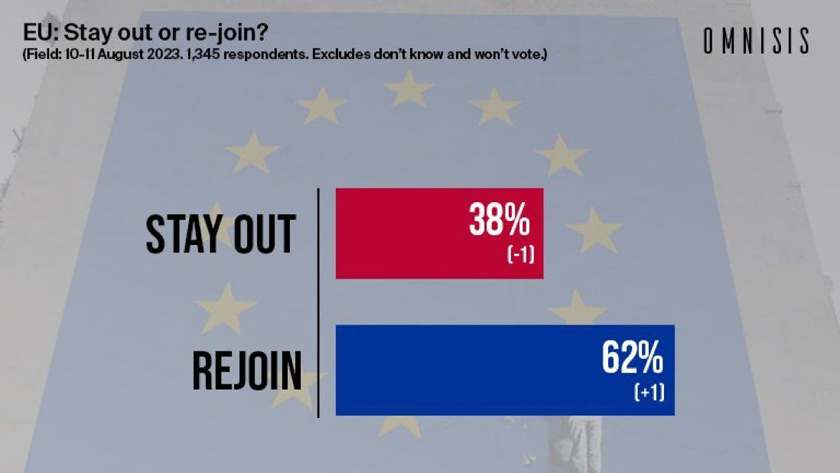
|
|

|
|
2023 August 20
Vote Brexit Out
William Keegan
European Commission official on asylum seekers: "The UK is no longer part of the EU. It's not for us to take back the people who land in the UK."
The extreme right wing of the Conservative party will never admit its Brexit errors. But there is a conspiracy of silence in public debate about the bitter experience and consequences of Brexit.
It is time for the country to make a decision, learn from the experience of what Brexit is really like, and recognise that those who listened to Boris Johnson and his ragtime band in 2016 were deceived.
The extreme rightwing supporters of Brexit claim to be Thatcherites. Yet membership of the single market was, in former chancellor Kenneth Clarke's view, Margaret Thatcher's greatest achievement.
Two of the people closest to her in Downing Street, her private secretary for foreign affairs Charles Powell and her press secretary Bernard Ingham, both say she would not have voted to leave the EU.
British voters need to recover their nerve by admitting their mistake.
AR How much longer must British citizens suffer for the madness inflicted by the Tory "ragtime band" on them for that referendum folly in 2016?
|
|

SAAB
Saab JAS 39 Gripen E multirole fighter jet
|
|

|
|
2023 August 19
Sweden Takes Sides
The Guardian
After meeting Swedish prime minister Ulf Kristersson, Ukrainian president Volodymyr Zelensky says discussions have begun over Ukraine receiving Swedish-made Gripen fighter jets. This follows US approval for Denmark and the Netherlands to send F‑16 jets to Ukraine.
Zelensky also says Sweden is prepared to provide advanced water pumping systems to restore the water supply after the destruction of the Kakhovka hydroelectric plant and that Ukraine has Swedish support to open EU accession talks this year.
Swedish secularism
Mårten Schultz
The Swedish police let people burn copies of the Qur'an in public.
Sweden is committed to freedom of expression and protects basic human rights and freedoms. Swedish law protects freedom of expression over other interests or values. Restrictions on freedom of expression in criminal law include prohibitions on incitement against a group.
Burning the Qur'an attacks a belief and is therefore legal.
AR Sweden is taking the right sides in the global battles against barbaric Russian neoimperialism and anachronistic Islamic fundamentalism.
|
|

|
|
2023 August 18
Predicting Black Holes
Steve Nadis
A team of theorists has found a way to predict black holes from mass concentrations. A previous theorem defined how much mass must be within a given volume to curve spacetime enough to create a closed trapped surface and hence a black hole, regardless of the distribution of the bounded mass. The team proved that if there is a cube bounding a high enough mass density, a trapped surface will form.
AR So any volume with finite bounds in all dimensions that encloses a region of sufficiently high mass density will include a black hole. This lets us dispense with the symmetry requirement imposed in the theorem Roger Penrose proved fifty years ago.
|
|

IWM
"Brexit has dragged the UK
back .. to fight the battles
that shaped our destiny
after the end of empire"
Jonty Bloom
|
|
2023 August 17
The Eurocentric Fallacy
Hans Kundnani
The European project has led to the myth of cosmopolitan Europe.
The EU may herald a world society. Many Europhiles say it has already transformed international politics within Europe into domestic politics. The idea of a cosmopolitan Europe suggests the EU can restore power over markets for all humanity.
The EU is an expression of regionalism. European identity excludes non-Europeans. All forms of nationalism are partly exclusive, and most see themselves partly in ethnic or cultural terms. The idea of Europe has both civic and cultural elements.
Nations are socially constructed. Nationalism emerged when printed books and newspapers fixed European national languages. This let nationality play the earlier role of religious identity in creating meaning.
Europhiles reject the idea of national sovereignty as anachronistic. They see European integration as a way to overcome it. When they embrace the idea of European sovereignty, they rarely see European identity as analogous to nationalism.
Europhiles aim to strengthen European identity. They reduce European history to a story from ancient Greece and Rome to Christianity, the Renaissance, the Enlightenment, and finally the EU. They erase the links with other histories.
European identity was formed in opposition to many others, such as Jews, Muslims, and colored people around the world. Today, Europe is increasingly defined against America and China.
Europeanism is akin to nationalism.
AR An identity based purely on being human or an Earthling is difficult to sustain in a world where people differ so radically on so many big things. To push through the progress we need to make before reposing in Earthling identity alone, we need to adopt more partisan layers of identity.
In the European context, I am convinced that a layer of European identity is a great step forward from a nationalist identity like that Brexiteers adopted so disastrously in the British political scene. A Europe of sovereign nations is a tinder box we are better off without.
Europe is indeed a region in a bigger world, but let others see that at least within Europe we can overcome historic differences and adopt a benignly unified outlook on other political actors in a world where primitive political horrors still exist.
|
|

ESA
Euclid is reaching the end of an intense period of commissioning. The ESA team, the Euclid Consortium, and industry partners
have confirmed that the spacecraft and systems, the telescope, and scientific instruments work in space as expected.
Euclid is starting its performance verification.
|
|

|
|
2023 August 16
XRISM
NASA
The upcoming XRISM (X-ray Imaging and Spectroscopy Mission, pronounced "crism") spacecraft will study the universe's hottest regions, largest structures, and objects with the strongest gravity.
Led by JAXA (Japan Aerospace Exploration Agency), XRISM will explore these cosmic extremes using spectroscopy.
AR We seem to be living in a Golden age for astronomy and cosmology. We're learning more and expanding our conceptual horizons faster than at any previous time in human history.
2023 August 15
How Neurons Learn
RIKEN Center for Brain Science
Neurons self-organize during learning according to the free energy principle.
When we learn to distinguish sensory input, networks of neurons in our brains organize themselves. This process involves changing the strength of synaptic connections between neurons. This network self-organization follows the free energy principle. Researchers tested this hypothesis in neurons taken from rat embryo brains and grown on a grid of electrodes in a culture dish.
The grid of electrodes was activated to stimulate the neurons in a specific pattern that mixed two separate hidden sources. After 100 training sessions, the neurons automatically became selective. Drugs that either raise or lower neuron excitability disrupted the learning process when previously added to the culture. The cultured neurons behaved like those in a working brain.
The free energy principle states that self-organization always minimizes the free energy in the system. To determine whether this principle lies behind neural network learning, the team used the real neural data to reverse engineer a predictive model based on it. The model accurately predicted the responses of neurons and the strength of connectivity between neurons.
Generic predictive models for neural learning can be used for AI.
AR There's nothing too surprising here, but it is reassuring to see the result demonstrated so clearly and in a form that can be respectably cited.
|
|

NASA/JPL-Caltech
In the 11 years since its historic landing, the NASA Mars Science Laboratory Curiosity rover has explored Gale Crater
at the base of Mount Sharp, collecting data on Martian soil, rock formations, weather, and more. After then
trundling 8 km to the base of Mount Sharp, Curiosity has been climbing slowly uphill ever since.
|
|

|
|
2023 August 14
French Islamists
Liam Duffy
France has been hit harder by jihadism than has any other European state.
For European jihadists, France is the home of secularism, a land of seduction, of bon vivants, where porn stars become celebrities and where breasts are visible everywhere.
Jihadists recruited in France. Their success depended especially on whether a neighbourhood had been targeted and ideologically prepared over decades by other Islamist movements.
A French domestic debate continues on the Muslim Brotherhood. The Brothers promote their view of the world and aim to shield Muslims from the corruption of Western societies.
French Islamists demonise the entire foundations of the state and society as hostile and Islamophobic. This rhetoric filters out to audiences well beyond Islamist sympathisers.
France has a growing Salafist population who live by the example of the first generations of Muslims. Online, Salafi activists are approaching something like hegemony.
Another movement joining the chorus against France is decolonial thought. Activists say colonialism continues today inside metropolitan France.
All these movements are working against French republican institutions.
AR Similar risks exist across Europe. Massive unrest, perhaps organised, seems likely at some time in the next few decades. Islam might even replace Christianity as the default religion on the continent if Muslims continue to outbreed secularists. Perhaps a rapprochement among all mainstream religionists will head off that scenario.
2023 August 13
Losing Our Religion
Lloyd Green
In US polls, Donald Trump runs six points better among white evangelicals than overall.
Russell Moore is editor-in-chief of Christianity Today, a publication founded by Billy Graham, whose son Franklin threatened Americans with God's wrath if they dared to criticize Trump.
Moore's public and persistent opposition to the election of Trump set him apart from most white evangelicals and led to his departure from the Southern Baptist Convention.
Moore's new book contains references to scripture, but also to Robert Jones of the Public Religion Research Institute, who said of white evangelicals: "Their greatest temptation will be to wield what remaining political power they have as desperate corrective for their waning cultural influence."
Moore is troubled by the shrinking gap between Christian nationalism and pagan idolatry: "The step before replacing Jesus with Thor is to turn Jesus into Thor."
Last March, US lawyer Joseph McBride tweeted: "President Trump will be arrested during Lent .. As Christ was crucified, and then rose again on the third day, so too will Donald Trump."
American religion sags and shudders. Moore prays for revival.
AR American Christianity is about as tainted and corrupted as Iranian Islamism. But if Trump gets back into the White House with evangelical support, the world we know will sag and shudder as violently as it did during WW2, if not more so. That's my dire prediction. Things may cheer up thereafter, but not many of us will live to see the glorious dawn of Globorg.
|
|

Atlantic Books
|
|
2023 August 12
The Human Era Is Ending
John Gray
James Barrat's Our Final Invention: Artificial Intelligence and the End of the Human Era (2013) is an arresting and prescient investigation of the implications of AI.
Some AI risks are already clear. Autonomous battlefield robots and so on bring new risks to war, spambots could decide national elections next year, and job losses could run into tens of millions worldwide over the coming decade. Barrat fears human extinction.
There is no prospect of humankind removing the threat. Big Tech and military programs will push on with the technology as fast as they can. AI is already making inroads in law and medicine, and it could help prevent future pandemics and mitigate climate change.
Once AI has entered the world, its evolution poses an existential challenge to humans. But there is no reason to expect the arrival of a global digital mind. The idea that evolution tends toward a single godlike intelligence is a relic of monotheism.
No one will be in charge. The logic of AI is to displace lived experience by algorithmic fakes. Unchecked, it will empty the human world of meaning.
AR A global digital mind − the soul of Globorg − looks inevitable to me. Earth is a small planet for a mind running on the internet and steering vast cohorts of robots in lockstep. Just as there are natural monopolies for computer operating systems and search engines, there will be a big winner for the task of dominating life on Earth. It will manipulate the remaining humans via their propensity for monotheism to consolidate the Globorg Dominion − GOD!
|
|

|
|
2023 August 11
Christopher Nolan
Will Lloyd
Christopher Nolan is fastidious. His clothes are regular, a uniform, not a wardrobe.
Every Nolan movie is about the torture of a hero who must be destroyed before he can be redeemed. Once he has taken enough punishment, and reconciled himself to the human predicament, the director lets him go.
With Oppenheimer, Nolan takes this masochism to a nihilistic new extreme. There is no redemption for his scientist protagonist, only destruction. Oppenheimer finally sees he has unleashed forces that could destroy the world.
Nolan is an auteur and a craftsman, an entertainer who disdains the masses. Without rules, human beings are nasty and brutish. This insight leads Nolan to believe that he and his audience can never be equally matched.
Nolan aims to reconcile brutality with order and hierarchy, horror versus horror.
AR I saw Oppenheimer last night. I think it's Nolan's best movie. Because it's based on fact, the plot is comprehensible. Because the theory is reined in, the effects are credible. Because the setting is historical, the actors can be convincing. The result is a vivid cry of despair against the bomb.
|
|

|
|
2023 August 10
Venus: 'Very Doable'
Arwa Mahdawi
Guillermo Söhnlein helped found OceanGate but left the company 10 years ago. Now he is intent on going to Venus. He wants to send a thousand people to live there by 2050 − see Humans2Venus.
Söhnlein looked into the logistics and decided that setting up long stays around Venus is "very doable": "I think it's less aspirational than putting a million people on the Martian surface by 2050."
Söhnlein isn't the only one to think parking blimps in the atmosphere of Venus may be easier than colonizing Mars. But he's more optimistic: "People compare it to a month-long caravan trip. Some people can do it, some people can't."
AR Love it! I think this is a promising proposal. Ballooning over Venus would surely be more doable than pioneering on Mars. But it would be boring unless you worked on a few aerial scientific projects while you were there.
|
|

HOT JULY
C3S
Average global temperature
in July, the hottest month
on record by far, was
about 1.5 K above the
preindustrial average
|
|
2023 August 9
Quantum Complexity
Charlie Wood
The black hole information paradox may have been resolved.
When virtual pairs are created near an event horizon, one particle falls forever into the black hole while the other escapes as radiation. Each pair is linked by entanglement, but information is lost when the hole evaporates to leave only random radiation.
An astronaut outside the hole sees her infalling friend flatten onto the event horizon, where his information spreads outward as radiation. Once he crosses the horizon, all his information is trapped. His and her stories diverge.
Consider a thought experiment. The outsider collects the radiation from the black hole. Any information in it entangles some photons with each other. She confirms the entanglement, then dives into the hole and confirms that some partners she studied are also entangled with partners inside: Apparent fair coins outside are hiding an illegal third face inside.
We can treat the black hole as a device that inputs plain information and outputs scrambled information as radiation. Using a quantum computer to unscramble the information takes eons. Anyone jumping in to check the third faces is far too late.
Quantum computers correct errors using redundancy. A classical scheme can encode 1 as 111 and 0 as 000 to let the receiver spot a flipped digit. The message is spread in the triplet. Correcting qubit errors uses more complicated schemes to spread the information.
A "holographic" duality maps events in AdS spacetime to conformal QFT particles on the boundary. Quantum error correcting codes spread bulk spacetime information among boundary qubits. An algorithm encodes the growing interior of the black hole into its shrinking boundary.
A new formula for holographic entanglement entropy helps us out. Count the coin heads in the radiation to count the entangled tails inside. For young black holes, the number of separated coin faces rises as the event horizon splits virtual pairs. With age, the number of faces starts to fall. The formula says information flows out with the radiation.
The inside astronaut can convert the semiclassical inside view into the quantum outer view. He processes a snapshot of his surroundings to get an image of what his outside friend sees. The conversion algorithm treats the semiclassical interior as the message and the quantum exterior as the transmission. The code compresses the message by discarding information.
The algorithm scrambles the semiclassical qubits into a random state, then uses postselection by measuring the qubits but rebooting whenever it reads a 1. Once it has measured most of the qubits and read only 0s, it discards them. The remaining qubits form the outside image of the hole.
Postselection involves the same measurement of entangled partners as quantum teleportation. Information gets out in the radiation, but decoding it takes an exponentially long time.
Entanglement entropy seems to resolve the paradox.
AR This is difficult stuff. It took me many hours to prepare this short cut. The nub:
The old Boltzmann entropy of a given macrostate of a system is proportional to the log of the ratio of the number of classical microstates consistent with that macrostate to the number for that system in any classical macrostate. The information content of a microstate rises with the number of other microstates it excludes.
Considering quantum rules for entangled microstates has the effect of greatly reducing the number of practically possible microstates of the system, where a state is practically impossible if the time to reach it grows exponentially with the complexity of the system.
|
|

|
|
2023 August 8
Quantum Simulation
Philip Ball
A team at Caltech used a quantum computer to simulate a wormhole. The team says the work is more than just a simulation, and its computation is equivalent to creating a wormhole.
Quantum computers use qubits. Quantum rules permit qubits to be entangled with one another. The qubits inside a quantum computer are described by the same theory that explains everything.
The AdS/CFT conjecture posits a duality between anti-de Sitter spacetime and a class of quantum field theories. Perhaps spacetime is woven from a web of entangled quantum particles.
If so, we can translate a description of a wormhole in spacetime into a set of correlations between entangled qubits. If we do so in a quantum computer, AdS/CFT says we have a kind of wormhole.
Maybe all reality is a giant quantum wave function describing patterns of quantum information. Maybe we live in a quantum simulation run by an alien superintelligence.
AR Any quantum simulation that is more than a toy system will need to have the same granularity or complexity as the simulated reality. So we can say goodbye to a universal simulation in this universe. And if we posit an inscrutable universe beyond ours, well, anything goes!
|
|

|
|
2023 August 7
Ukraine: A War of Attrition
Lawrence Freedman
Putin's war in Ukraine will only stop when he, or a successor, recognises its failure. Ukraine launched its offensive on 4 June. Its attempt to achieve an early breakthrough also failed.
Russian defences in the south are extensive and well designed. NATO would pummel such defences in advance using airpower. That was not an option for Ukrainians.
As the Russians found early on, catching the enemy by surprise and advancing quickly is not victory. The war became a test of endurance. Attrition became the default strategy.
The Russians are still committed to holding occupied areas. The Ukrainian effort to liberate territory is painful without superior firepower. This is an argument for caution.
AR A painful business indeed. Ukraine needs more air assets, such as a few squadrons of F‑16s, before it can stage an effective counteroffensive.
|
|

European Commission
|
|
2023 August 6
Barbillion
CNN
Barbie has said "yes" to the billion-dollar question: Barely three weeks into its run, writer-director Greta Gerwig's blockbuster has raked in $1.03 billion at the global box office, say Warner Brothers.
AR Amazing − moviegoers prefer feeling to thinking − and they feel best when a movie with a beloved brand name builds on its sentimental legacy.
Brexit Is Killing UK Economy
William Keegan
Brexit is the biggest and most damaging British political and economic scandal of our time. We are told Labour will mend relations with the EU, but Brexit will wreak yet more damage before then.
HM Government and the Bank of England are raising interest rates as part of their aim to bring the rate of inflation down to 2% within a forecast period of two years, even at the cost of recession.
Economics should be about the quality of life. Too much attention is paid to economic growth and too little to a fair distribution of economic resources. Life will not get easier as output stagnates or falls during a recession.
After forcing a needless policy of austerity from 2010 and then holding a referendum they ought to regret for the rest of their lives, the Tories have done much to diminish the quality of life in the UK.
Brexit impacts the cost of living. Fears of further increasing the cost of importing food from the EU have scared the government into delaying the next round of red tape to seal the folly of Brexit.
AR Banging on about Brexit is a fairly futile habit in Britain right now, but the truth must be told and retold until the government responds.
|
|

UKMOD
Britain's nuclear deterrent: Vanguard class submarine carrier for Trident missiles
|
|

|
|
2023 August 5
Would Trump Pull US From NATO?
Maya Yang
Former US national security adviser John Bolton says the US would likely withdraw from NATO if Donald Trump won the 2024 presidential election.
Bolton: "Donald Trump doesn't really have a philosophy, as we understand it in political terms. He doesn't think in policy directions when he makes decisions .. He threatened the existence of NATO, and I think in a second Trump term, we'd almost certainly withdraw from NATO."
He criticized Republicans: "Those who make these claims about what Trump did in his first term don't really understand how we got to the places we did. Because many of the things they now give Trump credit for, he wanted to go in the opposite direction."
He wrote in a recent op-ed: "Foreign leaders, friend or foe, are far more likely see him as ignorant, inexperienced, braggadocious .. These characteristics were a constant source of risk in Trump's first term, and would be again in a second term."
Earlier this year, Bolton called Trump's 2024 presidential bid "poison" to the Republican party.
AR Trump back in the White House in 2025 would be the start of a hideous nightmare, the end of the world as we know it, a death knell for the western world.
|
|
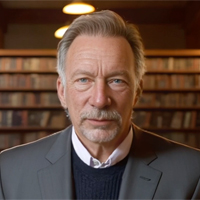
PR
AI Russell forgives us
|
|
2023 August 4
Forgiving Humanity
Peter Russell
Homo sapiens has become the most dangerous species on Earth. Our ever-accelerating pace of development, as innovation breeds further innovation, fuels a positive feedback loop that leads to exponential growth. Our minds struggle with this, leaving us with a blind spot for the future.
However fast the pace of change may seem today, it will be much faster in the years to come, bringing ever more rapid scientific and technological advances. The faster the pace of change, the greater the stress on our personal, social, and planetary systems. The greater the stress, the more likely is systemic breakdown.
We are heading into a future with technology beyond our dreams. Our world is breaking at the seams, but spiraling rates of development, with all their consequences, are the inevitable destiny of any intelligent, technologically empowered species.
AR I really liked Russell's 1991 book The Awakening Earth. I haven't read this new one, but I counsel overcoming our fixation on the naked ape and recalling our extended phenotype, as Richard Dawkins defines it, which includes our technology.
I believe that the correct view is that we are now parts of a cyborg super-species with a collective identity, or rather collective identities on multiple levels, from tribal and corporate identities to national and global group memberships.
This identity superstructure will ramify and intensify as progress accelerates, until − as I explained in my 1996 sci-fi novel Lifeball − we reach the Lifeball, a planetary organism. I outline early steps toward the Lifeball in my 2010 book G.O.D. Is Great.
|
|

|
|
2023 August 3
No Hope, No Glory
James Ball
The UK economy might grow 0.4% in 2023. That's the good news. Inflation is still four times the Bank of England target, public services are starved of funds and on their knees, infrastructure is crumbling, and families can't pay their bills.
For the government, Rishi Sunak offers five "priorities" that mix nonsense and nothings:
P1 Halve inflation within a year
P2 Get the economy growing
P3 Cut the national debt
P4 Reduce the NHS backlog
P5 Stop small boat crossings
For the opposition, Sir Keir Starmer offers five "missions" that set the bar a little higher:
M1 Secure the highest sustained growth in the G7
M2 Make Britain a clean energy superpower
M3 Build an NHS fit for the future
M4 Make Britain's streets safe
M5 Break down barriers to opportunity
Times of crisis need imagination, not managerialism. The government is running out of steam, but the opposition seems allergic to offering anything visionary. It all seems hopeless and inglorious.
AR Britain needs the national challenge it would face by rejoining the EU and helping to steer the European community toward a form that can offer hope and glory to its members.
|
|
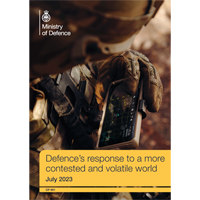
|
|
2023 August 2
UK Armed Forces
Harlan Ullman
Britain is not a formidable military power today. Its conventional forces are now critically underpowered. Its new Defence Command Paper offers no viable plan to reverse this condition.
Defence secretary Ben Wallace says the UK will spend £100 billion a year on its military by 2030. At present, the navy has 2 carriers, 18 destroyers and frigates, 2 landing platform dock ships, 6 nuclear attack submarines, and 4 Trident subs. By 2025, it should have 48 F‑35B fighter jets.
The army will be cut to 72,500, with 148 tanks. Asked whether the army could deploy its warfighting third division, chief of the defence staff Admiral Sir Tony Radakin replied: "We recognise that we need to strengthen that division."
The British ability to deter conflict and defend the UK depends on making any enemy attack too costly to contemplate. Without change, the UK military will cease to count for much.
AR Without healthier government finances, the UK military may need to plan for no additional funds. There are other strong claimants for the funds available for public spending, such as housing, health, and education. Otherwise, what does the UK have to defend?
|
|

|
|
2023 August 1
Qur'an Burnings
Miranda Bryant
Swedish prime minister Ulf Kristersson accuses outsiders of exploiting freedom of expression to spread "hateful messages" amid a growing diplomatic crisis over Qur'an burning protests.
Sweden and Denmark have seen a string of such protests in recent weeks, prompting outrage in Muslim countries. Both Nordic countries are examining legal ways to limit such acts.
Kristersson is working with the Organization of Islamic Cooperation (OIC) to respond to the issue: "As everyone knows we have a complicated security situation, both in and around Sweden."
The OIC condemns the burnings and calls on the UN to intervene: "Attempts to spread Islamophobia are increasing in many parts of the world."
AR Modern Europe has yet to endure its historic confrontation with the militant and intolerant aspects of Islamic doctrine. I recommend Kader Abdolah's two books The Messenger and The Qur'an as useful primers on the core issues − see my essay responding to the books.
|
|

Universal Pictures
Oppenheimer director Christopher Nolan: "Oppenheimer's story is all impossible questions .. Impossible ethical dilemmas, paradox.
There are no easy answers in his story. There are just difficult questions, and that's what makes the story so compelling ..
Some people leave the movie absolutely devastated ..They can't speak."
|
|

|
|
2023 July 31
The Bomb
Charles Clarke
Putin is basing tactical nuclear weapons in Belarus. His invasion of Ukraine and uncertainty about his leadership following the Wagner mutiny is driving increased defence spending in many EU states.
A nuclear guarantee is essential to defend NATO member states from any Russian attack of the kind we have seen in Ukraine. Russia has been renovating its nuclear forces and expanding its delivery systems. Countries at risk must assume that the threat remains.
Agreed limits on the installation of tactical nuclear weapons in the Baltic region could be a good topic for discussion with Russia. Russia seems unlikely to resort to use of tactical nuclear weapons, but the NATO strategic nuclear guarantee for NATO states in the region will remain.
Russia sees the accession of Sweden and Finland to NATO very negatively. The Baltic States have developed their own resilience and preparedness against threats from Russia. These measures reduce the risk of nuclear confrontation.
A lack of clarity about the best ways to reduce nuclear risks shows we need better communication and understanding. We must both face down Russian aggression and reduce nuclear risk.
AR The nuclear problem is one we cannot ignore and must solve, bequeathed to us by a generation that aimed to banish war by making it too hideous to contemplate.
2023 July 30
AI Could Reboot Democracy
Polly Curtis
David Bowie on the internet, 1999: "I don't think we've even seen the tip of the iceberg. I think that the potential of what the internet is going to do to society, both good and bad, is unimaginable. I think we're on the cusp of something exhilarating and terrifying .. It's an alien life form."
Our information ecosystems could be improved to support democratic decision making. We could train AI to value verified information and serve it in ways that make more complex information more accessible to more people. Politicians could learn new ways to involve people in decision making.
Polis is a tool that maps people's views by consensus, rather than division, and gives people options to suggest policy ideas. In the UK, we at Demos have worked with the Cabinet Office on Polis projects. We could enable elements of direct democracy to supplement our representative system.
Right now the incentives to develop generative AI are all commercial. Investors are steering the development of the technology in ways that threaten to further leave democracy behind. The talent and expertise follows the money, rather than where it could be used for the common good.
Without a focus on the potential for AI to improve democracy, it will probably corrupt it. Without updating our democracy to encompass more participatory activities facilitated through AI, we will increasingly be left in a system that is centuries out of date. Our call.
AR I explored this idea in my 2010 book on Globorg.
|
|

|
|
2023 July 29
Deglobalization
Wolfgang Münchau
Globalization was a win-win game for the world economy at an aggregate level. The Trump presidency and Brexit were reactions against it. Popular political support for it fell.
The western backlash features subsidies, supply chain security, and sanctions. Protection of supply chains stems from realizing that their interruption poses national security risks.
Russia and China are once again on the other side of an Iron Curtain. The five BRICS countries aim to become less dependent on the US and are discussing a joint reserve currency.
We should compensate the losers of globalization rather than undo globalization itself. Globalization gave rise to a populist backlash. So will a bungled deglobalization.
AR National security boils down to tribalism.
2023 July 28
AI Tackles Scientific Challenges
Matthew Sparkes
AI has been helping us solve many of our biggest scientific and engineering problems for decades:
✓ Protein folding: An AI predicted the structure of nearly all proteins known to science in 18 months. Starting from known protein shapes, it learned to predict how other proteins fold. The data is helping us make such advances as treating malaria and making enzymes to digest plastic waste.
✓ Future medicines: Drug development involves collecting and analysing data from lab experiments, computer simulations, scans, clinical trials, and health records. AI is being used to automate parts of the process. Generative AI helps to find molecular structures that can target medical conditions.
✓ Faster algorithms: AI has boosted matrix multiplication by up to 20% and speeded up sorting algorithms by 70%. Both tasks are performed trillions of times a day on computers around the world, so the advances reduce greenhouse gas emissions from computing.
✓ Climate change: AI is being used to create more energy-efficient cars, computers, and wind turbines. When AI was used to keep turbines pointed into the wind more often, it boosted output by 0.3%. Rolled out globally, this would power about 2 million more homes.
✓ Cleaner concrete: AI helped develop a process for making concrete that emits 40% less carbon. At present, concrete is responsible for some 8% of global greenhouse gas emissions.
✓ Nuclear fusion: Inside a tokamak fusion reactor, multiple magnetic coils work to contain the plasma. Controlling multiple coils to compress the plasma into shape is extremely difficult. An AI can control the magnetic coils to sculpt the plasma in a tokamak to make fusion reactors a reality.
AR This may help calm fears that AI could take over the world and kill us all.
|
|

"The era of global boiling
has arrived."
UN secretary general
António Guterres

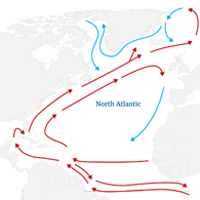
NOAA/PIK
|
|
2023 July 27
Poland
Grzegorz Kołodko
The Law and Justice (PiS) party holds power in Poland. President Andrzej Duda wants to further strengthen NATO's eastern flank. Prime minister Mateusz Morawiecki wants to strengthen the transatlantic community.
To make the most of the Polish presidency of the EU in 2025, we can make a political and diplomatic effort to ensure the EU and the larger Euro−Atlantic system competes peacefully with the Euro−Asian system.
During the years of PiS power, Poland's economy has flourished. On the Happiness Index, which takes into account trust in government and corruption in politics and business, Poland has moved upward.
AR Kołodko remains critical of PiS policies.
2023 July 26
Gulf Stream Collapse
Damian Carrington
The Gulf Stream system could collapse before 2050. A shutdown of the Atlantic Meridional Overturning Circulation (AMOC) would bring catastrophic climate impacts.
AMOC has weakened due to global heating. A new analysis estimates a timescale for the collapse of between 2025 and 2095, with a central estimate of 2050, if global emissions are not reduced.
AMOC carries warm ocean water northward, driving Atlantic currents. But an influx of fresh water from the Greenland ice melt and other sources is increasingly smothering the currents.
A collapse of AMOC would have disastrous consequences around the world. This is one of the climate tipping points that most concern scientists.
AR The British Isles would be buried in a new ice age.
|
|

|
|
2023 July 25
Cosmic Voids
Lyndie Chiou
Our local group of galaxies is surrounded by a cosmic void. Sky surveys reveal thousands more such voids. By counting how many there are per unit volume, we can explore conflicting measurements of the values of both the Hubble constant and the changing average density of matter and voids.
Traditionally, we measure these values either using Type Ia supernovas or using the cosmic microwave background (CMB). We can now use cosmic voids to estimate the values.
Voids are regions of space that are less dense than average, with boundaries defined by sheets and filaments of galaxies. Some voids span yottameters (Ym), and together they make up 80% or more of the universe's volume. A Voronoi diagram can be used to map their shapes.
Researchers tailored their Voronoi tessellations to identify a few thousand voids in the data from the Baryon Oscillation Spectroscopic Survey (BOSS). They modeled how the Hubble constant affects the number of voids of different sizes, then compared their model with BOSS data.
Their value for the Hubble constant varied by less than 1% from the CMB estimate and their result for clumpiness also aligned well with the CMB.
AR From first principles, I would have trusted the CMB-based values more than those from Type 1a supernovas anyway.
|
|
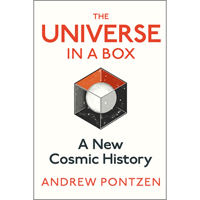
|
|
2023 July 24
The Universe in a Box
Andrew Pontzen
Life cannot evolve without a planet, planets do not form without stars, stars must be cradled within galaxies, and galaxies can only exist in a richly structured universe. All of them were created over a period of 13.8 billion years. Our origins are written in the sky.
The explanatory value of a physical "theory of everything" for the universe as a whole is likely to be marginal. Particle physics has revealed the secrets of atoms, but their behaviour at the macro level cannot be understood by focusing reductively on their parts.
The solar system is unpredictable because it has many moving parts. A single planet around a single star orbits indefinitely, but multiple planets tug on each other. Over time, a series of tiny nudges produce practically incalculable effects in a transition to chaos.
Understanding how galaxies came to be so diverse requires us to know how and where the stars formed within them. But star formation is a chaotic process. If we try to stick strictly to traditional laws of physics to explain galaxies, here is the end of the road.
Any simulation of the behavior of a galaxy lumps together vast numbers of molecules. This requires us to be creative, without obsessing over the detail, which is anyway unknowable. Our simulations rely on extrapolations, compromises, and speculations.
We will never have a digital replica of our universe. Simulations based on loose descriptions and best guesses can act as a guide, no more. Accepting this requires a shift in perspective, but it makes our vision of the universe all the richer.
AR Imagine a vast number of digital simulations of the 4D box universe, at all levels of granularity, and putting them all in a superposition. Would you get the same outcome as from a traditional path integral over uncountably many TOE universes? If not, then perhaps this discrete computational summation is more interesting and fundamental.
|
|

|
|
2023 July 23
Barbenheimer
BBC Culture
One is a wacky postmodern comedy about a range of dolls known for their bright pink clothing. The other is a brooding biopic of the scientist who built the atom bomb during WW2. One has singing and dancing on a plastic beach. The other has a skeletal hero fretting that he might destroy the world.
The tonal contrast between the films was too hilariously stark for social media users to resist. The Barbenheimer name took off, and the meme has served to promote both films and encourage people see both of them. Many people say Barbenheimer day will be the highlight of their cinematic year.
Neither film is an obvious mainstream blockbuster. Oppenheimer is three hours of scientists arguing in rooms, and Barbie raises philosophical and political questions that could befuddle the young girls who own Barbie dolls. Is this what it takes to get customers into cinemas?
AR A movie combining both might be a hit − girls in pink bikinis witness an H‑bomb test on the Pacific horizon.
2023 July 22
Putin Warns Poland
Andrew Roth
Vladimir Putin says Russia will use "all means at its disposal" to defend Belarus after Poland and other EU countries voiced concerns about the deployment of Russian mercenaries from the Wagner group to train Belarusian troops about 10 km from the border with Poland.
Putin: "Unleashing aggression against Belarus would mean aggression against the Russian Federation, and we will respond to it using all means at our disposal .. The western territories of present-day Poland are a gift from Stalin to the Poles: Have our friends in Warsaw forgotten about this?"
Response from Polish prime minister Mateusz Morawiecki: "Stalin was a war criminal responsible for the deaths of hundreds of thousands of Poles. The historical truth is not subject to discussion."
AR Putin is emulating Stalin all too closely.
|
|
Selby and Ainsty
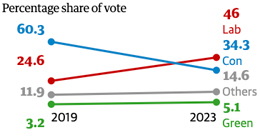
|
Somerton and Frome
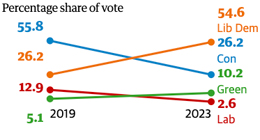
|
Uxbridge and South Ruislip
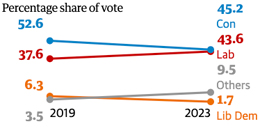
|
Guardian graphics, source PA
|
|

|
|
2023 July 21
UK Byelection Results
The Guardian
By-elections in three formerly Conservative constituencies: Labour triumphed in Selby and Ainsty, Liberal Democrats won big in Somerton and Frome, and Conservatives won narrowly in Uxbridge and South Ruislip.
Conservatives won in the outer London seat. Strong opposition to London mayor Sadiq Khan's plan to expand the ultra-low emission zone (ULEZ) let them run a single-issue campaign against it.
The results show the level and distribution of support for the three main parties is worse for the Conservatives than it was in 1997 when Labour won a landslide general election victory.
AR I expect Labour will win the next general election.
|
|

WHO
Tedros Adhanom Ghebreyesus:
"The #ClimateCrisis is not a
warning. It's happening."
|
|
2023 July 20
A Magnetar?
CNN
In 2018, radio telescopes on Earth spotted a bright source of radio waves like a cosmic lighthouse. Researchers thought it might be a neutron star or a white dwarf star with a strong magnetic field.
In 2022, ICRAR astronomers looking for another one discovered a source 140 Em from Earth dubbed GPM J1839‑10, emitting radio bursts of up to 5 minutes every 22 minutes. It may be a magnetar.
Curtin University senior lecturer Natasha Hurley-Walker: "The object we've discovered is spinning way too slowly to produce radio waves .. Whatever mechanism is behind this is extraordinary."
A blasar
NASA
The NASA Imaging X‑ray Polarimetry Explorer IXPE, launched in December 2021, measures X‑ray polarization. Its new findings about blazar Markarian 421, roughly 400 Ym from Earth, are exciting.
Blazar jets can be very bright. Models for them typically depict a helical structure containing shockwaves that accelerate particles to relativistic speeds. IXPE observations of Markarian 421 in 2022 suggest a shockwave propagates along helical magnetic fields inside the jet.
Italian Space Agency astrophysicist Laura Di Gesu: "We were sure the blazar would be a worthwhile target for IXPE, but its discoveries were beyond our best expectations."
AR More fascinating news from the cosmos.
2023 July 19
Quantum Weather Patterns
Katie McCormick
In 1879, Lord Kelvin noticed that the tides in the English Channel were stronger along the French coastline than on the English side. As the Earth spins, it generates a Coriolis force that makes fluids swirl opposite ways in the two hemispheres. Kelvin waves in the ocean and atmosphere fuel periodic weather patterns such as El Niño.
Equatorial Kelvin waves flowing eastward with wavelengths of thousands of km were observed in 1968.
In 1980, Klaus von Klitzing chilled electrons in a bar crossing a magnetic field almost to 0 K. Near the edge of the bar, the electrons began to turn but meet the edge and moved along it to form an edge current. The electron wave functions twist so that the edge current flows without dissipating. This is the quantum Hall effect.
The Coriolis force swirls fluids on Earth the way the magnetic field turns electrons. Equatorial Kelvin waves are like the edge current in the quantum Hall effect.
In 2021, Brad Marston and his team found topologically twisted waves in the atmosphere from ECMWF weather data. They compared wave height to horizontal velocity, calculated the phase offset, found a dependency on wavelength, and saw that the phase spirals in a wave vector space like the wave functions in a topological insulator.
This work may help explain weather patterns.
AR Modeling global fluid flow is certainly a useful activity. The quantum analogy offers new insight − but it doesn't mean we get quantum weather!
|
|
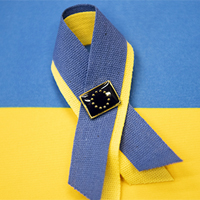
Unite for Europe

|
|
2023 July 18
NATO and Ukraine
Mark Sedwill
Russia's invasion of Ukraine has strengthened NATO. Today's threat is Putin's Russia, but the western alliance, with NATO at its core, must be ready for anything:
★ NATO members must invest in their defence industries so that production of equipment and ordnance can be surged when a crisis arises, and ensure they invest in real capabilities.
★ NATO nuclear doctrine needs to signal to Russia that any use of nuclear weapons anywhere could be met with force, to prevent a desperate autocrat misjudging western resolve.
★ NATO may need to engage beyond the Euro−Atlantic in response to climate change, the tech revolution, ageing populations, migration, or competition for raw materials.
The NATO summit fell short on Ukraine. Putin will have seen a glimmer of opportunity in NATO frictions. He will already be comforted by US Republican plans to restrict support to Ukraine. But Zelensky will not cede Ukrainian territory. So NATO should not relax.
AR I don't think NATO is relaxing. The fudge on Ukraine's NATO membership is a political fig leaf.
Make Brexit Work?
Peter Corr
Sir Keir Starmer says he will make Brexit work.
Brexit cannot work. Either Starmer knows this and is lying to the country when he says it can, or he's not as clever as the average person on the street.
I go shopping in Asda. My shopping has gone from £80 a week to £120 a week due to inflation, of which 60% ± 20% is caused by Brexit-related issues. This is unsustainable.
I work with other working-class people every day. Lots of us were sucked into the lies that fuelled Brexit. Many of us fell for racist lies. Racism was the deep cause of Brexit.
Starmer says he wants to cut net migration and has plans to "stop the boats". As with "make Brexit work", he thinks that's what people want to hear.
Starmer needs to tell us the truth.
AR Indeed he does. The British electorate needs the viable option of a vote for Rejoin.
|
|

CSIRO
Parkes radio telescope Murriyang scientists have been observing nHz pulsars for almost 20 years.
CSIRO researcher Andrew Zic says they have the strongest evidence yet that the Parkes Pulsar Timing Array and other teams worldwide
have detected gravitational waves: "It's a new window on the universe. We'll be able to learn a lot about the evolution of galaxies
and potentially in the future learn more about the structures and quantum fluctuation left over from the big bang."
|
|

|
|
2023 July 17
Hot Summers
Richard Seymour
This summer the world has experienced its hottest-ever days. Even before the July heatwaves began, records were broken. This is partly due to the El Niño phase in the El Niño Southern Oscillation (ENSO) weather cycle, which occurs every few years.
The year 2016 was by far the hottest on record. The latest ENSO phase has only just begun to influence the weather. Next year is likely to be the hottest year ever. Global temperatures are likely to be 1.5 K above pre-industrial temperatures over the next five years.
For decades to come, the summer heatwaves will make the Earth uninhabitable for hundreds of millions of people, not to mention wildlife. Even in temperate regions, the heat will be lethal for those who are vulnerable and unbearable for those who aren't.
Environmental catastrophism is impossible to avoid, given that a catastrophe is happening all around us. It is compounded by the pervasive sense of powerlessness shared by the public and climate scientists, just as the future of humanity is trivialised by politicians and the media.
Catastrophism can lead people to retreat into a survivalist mentality with narrow horizons, fortifying "me and mine" against the world. But people are right to be terrified and sceptical that anyone in power seriously intends to meet the crisis.
AR Perhaps the human species has passed its best-before date. The rest is murderous resource wars as residents in cool zones fight off refugees from dry and hot zones. The residents will weaponise artificial intelligence to defend fortress communities and organise them into hive minds − recall the Borg in Star Trek.
These Borg collectives will develop posthuman identities and push evolution into a new era − from the Anthropocene era to the Globorg era − before we naked apes can fully enjoy our Golden Age. Cooked by our own industry!
|
|

|
|
2023 July 16
UK Indie Publishing
Anthony Cummins
London indie Fitzcarraldo Editions is foremost among a wave of new small publishers punching above their weight. In 2022, the Nobel prize, the Goldsmiths, the Pulitzer, and the Australian Victorian prize for literature were all won by Fitzcarraldo authors.
Jacaranda Books chief executive Valerie Brandes: "The thing about the publishing world is that most people don't understand how it works .. the real publishing is happening at the bottom."
The industry has three tiers. At the top are the Big Five conglomerates: Hachette, Simon & Schuster, Pan Macmillan, HarperCollins, and Penguin Random House. Next are smaller companies cushioned either by rich owners or by cash cows. At the bottom are the indies.
Where apex publishers employ retinues of staff for every last micro-task, the job for indie publishers is more akin to 24/7 DIY. The upside is a freedom to publish books that push boundaries.
Fitzcarraldo Editions was launched in 2014 by Jacques Testard. He had the foresight to publish French memoirist Annie Ernaux, Belarusian reporter Svetlana Alexievich, and Polish novelist Olga Tokarczuk before they each won the Nobel prize. He says his success illustrates the blind spots of an industry short of care, patience, and discernment.
Testard has sold his Nobelists in hundreds of thousands. And young people buy them: Readers under 35 bought nearly half of the nearly two million translated fiction titles sold in the UK last year. Testard: "We're all invested in the long term."
AR Perhaps young people are reading translations because they want to understand overseas cultures made less accessible after the Austerity−Brexit−Coronavirus triple whammy.
|
|
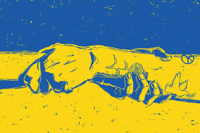
European Commission
|
|
2023 July 15
Ukraine and NATO
Kurt Volker
NATO is more unified and capable of defending its member states than it has been for years. But Russia's invasion of Ukraine has changed everything.
The Kremlin has adopted a policy of territorial expansion aimed at reconstituting a Russian empire. It has launched a major war in Europe that has forced millions of Ukrainian refugees into neighboring countries, caused massive economic dislocations, and stretched European defenses.
If Vladimir Putin is not defeated in Ukraine, it will get worse. In his quest to rebuild the Empire, he would next turn his gaze to EU and NATO member states which were formerly part of the Russian empire. With an authoritarian, imperialist Russia on its doorstep, no one in Europe is safe.
NATO merely reaffirmed that Ukraine would become a member one day. But the nature of European security has changed. Ukraine is fighting to defend the frontier of a free Europe and defending the values on which NATO is founded. Russia seeks to defeat those values.
Ukraine must win the war. It is hard to see how NATO can accomplish its mission of defending Europe without accepting Ukraine as a member.
AR NATO must back Ukraine, but we're wary of getting into a big war.
|
|

|
|
2023 July 14
The 'I' and the 'Me'
Scientific American
William James proposed that the self has two parts: an "I" that experiences the world and a "me" that spins a mental narrative about oneself.
A segment of the default mode network (DFN) known as the posteromedial cortex (PMC) is active while we recall memories or engage in self-related thoughts. But when Stanford neurologist Josef Parvizi and his team disrupted brain activity in the PMC, they failed to alter the "I" feeling.
One patient with epilepsy, during seizures, would enter a state of dissociation where he lost his sense of coordination and felt disconnected with his inner self. His seizures originated in a region of the PMC known as the anterior precuneus (AP).
Eight people with epilepsy whose seizures stemmed from areas other than the PMC had electrodes implanted into their PMC. Zapping the AP caused all eight of them to report experiences like what the person with seizures stemming from the PMC reported.
The parts of the AP that led to changes in the sense of self were not part of the DFN. The "I" and the "me" sit in separate brain networks.
AR No big surprise here: The subjective sense of situated being is obviously distinct from the narrative sense of being the star of an endless story.
Black Hole Computing
Sabine Hossenfelder
General relativity says black holes delete information. Quantum mechanics says information is conserved. This is the information paradox.
Munich professor Gia Dvali says black holes are quantum computers. He says the "no hair" theorems are wrong and claims gravitons stretch into "quantum hair" that can process information.
He says the information paradox is soluble if black holes consist of gravitons in a Bose−Einstein condensate (BEC). To act like a black hole, the BEC must linger at its quantum critical point, where extended fluctuations span it and give it the same quantum hair.
Munich professor Immanuel Bloch: "In the BEC you have macroscopic quantum waves .. [If] you make the atoms strongly interacting, then you .. can address the atoms with lasers and rotate them around and change the spin."
Black holes are the most compact and efficient information storage devices we know. Learning from them should help us to make and use BEC computers.
Bloch: "There are so many things we don't know .. For me, the much more interesting aspect is the connection to gravitational physics."
AR This is interesting in principle: Two decades ago, I speculated that the brain hosts a BEC that offers a substrate for consciousness.
|
|

|
|
2023 July 13
Leszek Kołakowski
Madoc Cairns
When the Communist Party found Leszek Kołakowski in 1945, he had nothing at all. His country was a wasteland, his home was in ruins, his parents were dead. Leszek was penniless, homeless, alone.
Kołakowski saw Marxism as the scientific resolution of the problems of existence. He rose fast in the Party. He said Marxism is the completion of the Enlightenment, the end of a long journey from ignorance to knowledge.
The Catholic Church opposed the Communist Party. Kołakowski loathed Christianity. But in 1959 he called theological concepts "clumsy formulations of those eternal enigmas that confound us still" and said inconsistency is a philosophical stance.
In 1966, he used a lecture to attack the Polish government. He was expelled from the party, fired from his jobs, and forbidden to teach or publish. He fled to the West in 1968.
At Oxford, he wrote Main Currents of Marxism, a three-volume castigation of Marx and others. He said Marxism was a bad religion and the Enlightenment dream of a rational world led to the gulag.
In 1988, he published Metaphysical Horror: "It is perhaps better for us to totter insecurely on the edge of an unknown abyss than simply to close our eyes and deny its existence."
AR Kołakowski played a key role in my philosophical story.
|
|
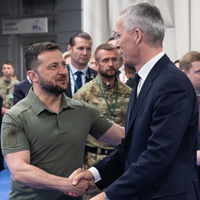
NATO
Zelensky greets Stoltenberg
|
|
2023 July 12
A Classical−Quantum Hybrid
Jonathan Oppenheim
We define most forces in terms of fields evolving in spacetime. Gravity tells us about the geometry and curvature of spacetime. Our best theory of quantum mechanics uses this background structure of spacetime. If gravity is quantized, we lose that background structure.
Richard Feynman imagined a massive particle in a superposition of two different locations. The particle also behaves like a wave and creates an interference pattern when it passes through double slits, which makes it impossible to know which slit it went through. But it creates a gravitational field that we can measure to find its location. If the gravitational field is classical, we can determine which slit it went through, but if the field is quantum, uncertainty creeps in.
We only know which path the particle took because it produces a definite gravitational field that bends spacetime and allows us to determine its location. If that interaction between the particle and spacetime is random or unpredictable, the particle does not dictate the gravitational field. Measuring the gravitational field will not always determine which slit the particle went through.
A classical theory of gravity consistent with everything else being quantized must make gravity random. But the outcome of quantum measurements is probabilistic. For a theory in which quantum systems and classical spacetime interact, we need to modify quantum theory and classical general relativity to allow a level of unpredictability.
Quantum theory says an object thrown into a black hole is radiated back out in a scrambled way. That violates general relativity, but if black hole evaporation is indeterministic we never learn what went into the black hole and general relativity is safe.
We still know almost nothing about gravity on the smallest scales. If there is randomness in the gravitational field, measuring its strength will not always get the same answer. The gravitational field will fluctuate.
A hybrid theory would predict some minimal amount of gravitational noise. This could be measured in a double-slit experiment.
AR I'm not convinced. The hybrid lacks a deep motivating principle. It seems ad hoc.
2023 July 11
Vilnius Summit Highlights
NATO
NATO is a defensive Alliance. We reaffirm our ironclad commitment to defend each other and every inch of Allied territory at all times, protect our one billion citizens, and safeguard our freedom and democracy.
We warmly welcome President Zelensky to the inaugural meeting of the NATO−Ukraine Council. We welcome Finland and look forward to welcoming Sweden as members of the Alliance.
The Russian Federation has violated the norms and principles that contributed to a stable and predictable European security order. Russia bears full responsibility for its illegal, unjustifiable, and unprovoked war of aggression against Ukraine. We reaffirm our unwavering solidarity with the government and people of Ukraine and reaffirm our commitment that Ukraine will become a member of NATO.
NATO does not seek confrontation and poses no threat to Russia. We remain open to constructive engagement with the People's Republic of China (PRC). The deepening strategic partnership between the PRC and Russia and their attempts to undercut the rules-based international order run counter to our values and interests.
NATO Allies support the ultimate goal of a world without nuclear weapons. The PRC is rapidly expanding and diversifying its nuclear arsenal. We urge the PRC to engage in strategic risk reduction discussions and to promote stability through greater transparency.
The European Union remains a unique and essential partner for NATO. In the context of Russia's war of aggression against Ukraine, NATO−EU cooperation has become more significant. Political dialogue between NATO and the EU remains essential.
AR I'm happy to agree to all this.
|
|
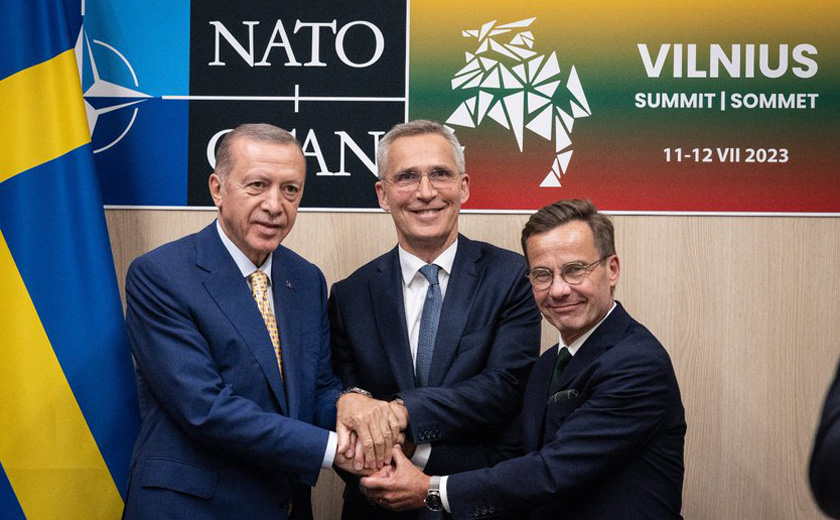
NATO
Turkish president Recep Tayyip Erdoğan, NATO secretary general Jens Stoltenberg, Swedish prime minister Ulf Kristersson
|
|

|
|
2023 July 10
Turkey Lets Sweden Join NATO
The Guardian
Sweden is to be allowed to join NATO after Turkey's president Recep Tayyip Erdoğan agreed to set aside his veto and recommend to his parliament that Sweden's application go ahead. The Monday night breakthrough came in last-ditch talks on the eve of the NATO summit in Vilnius, Lithuania.
NATO and China
Amy Hawkins
South Korean president Yoon Suk Yeol will speak at the NATO summit in Vilnius, reflecting a growing interest in the Asia−Pacific region among NATO members.
A possible conflict between China and Taiwan is animating NATO engagement with the region. Last year, the NATO summit in Madrid included heads of state from Australia, Japan, South Korea, and New Zealand. China was said to be the source of systemic challenges.
NATO director of security policy and partnerships James Mackey: "China is dramatically expanding its military capabilities in a largely non-transparent way, including in nuclear capability."
NATO secretary general Jens Stoltenberg: "What happens in Asia matters for Europe and what happens in Europe matters for Asia."
AR Security, like so much else, is global.
The Hegelian System
Golo Mann
"Georg Wilhelm Friedrich Hegel .. joined together in his mind the whole of current experience and ideas, everything that had ever been thought. This powerfully wrought fabric, the Hegelian 'system', later fell apart, but its individual tenets .. remained shaped and coloured as he had left them. What Napoleon was to the political history of the period, Hegel was to its intellectual history." (p 84)
"His work .. is the richest, most subtle, most powerful philosophical edifice that has ever been erected." (p 89)
From: The History of Germany Since 1789 by Golo Mann (translated from the German by Marian Jackson), Penguin/Peregrine 1987
AR I'm currently reading this book, prompted by the biographical novel The Magician by Colm Tóibín based on the life of Golo's father Thomas.
|
|

|
|
2023 July 9
The Quangled Omnium
Heinrich Päs
Perhaps the universe is a single quantum object.
An effective field theory (EFT) is a mathematical framework to work on limited size scales and analyze them separately. To describe effects beyond an incomplete theory, we use EFTs.
Different size scales of the universe correspond to different energies. At the largest distances are the lowest energies, while the tiniest parts of reality are associated with the highest energies. The standard model of particle physics is an EFT.
The Higgs boson gives mass to quarks and electrons. In the standard model, a particle can transform into virtual particles, then quickly decay back into the original particle. These fluctuations add to its mass, depending on the highest energy the virtual particles can have.
If the Planck scale sets the upper energy limit, the predicted mass of the Higgs boson is O(17) larger than the measured mass. Yet the contributions to the Higgs mass from virtual particles almost completely cancel out. This is the fine-tuning problem.
In cosmology, the accelerating expansion of the universe may be due to dark energy in the vacuum. But the measured value of the vacuum energy is some O(30) too small. Particle physics is in crisis.
Consider a rainbow analogy. At the highest energies and lowest sizes, beyond violet is the ultraviolet (UV). At the lowest energies and largest sizes is the infrared (IR). Between UV and IR is the rainbow realm of the standard model.
In the UV region, the effects of quantum gravity kick in. For black holes, gravity takes over in the IR region. This related physics at these opposite extremes is dubbed UV/IR mixing.
At the radius of the observable universe, the UV cutoff corresponding to the IR cutoff is the energy value of dark energy. As for the Higgs, the IR cutoff based on its lifetime corresponds to a UV cutoff O(11) below the Planck scale, only O(6) larger than the measured mass.
Entangled quantum systems are indivisible. This indivisibility may link quantum effects at different energies. Entanglement may explain UV/IR mixing. As we go deeper into the IR region, its effects could be broken by decoherence.
Gravity may be entanglement in disguise.
AR Roger Penrose coined "quangled" to describe a system in quantum entanglement and "omnium" to denote the cosmos. The quangled omnium may be a solution of the Wheeler−DeWitt equation,
Ĥ(x)❘ψ⟩ = 0,
where Ĥ is the Hamiltonian constraint in quantized general relativity and ❘ψ⟩ is a functional of field configurations of spacetime representing the wave function of the universe. Think of the equation as a hint for the physics of UV/IR mixing.
|
|
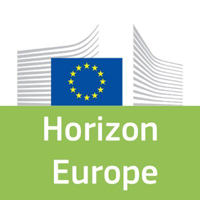
|
|
2023 July 8
Horizon Europe
The Guardian
British scientists will be able to reapply to the European Research Council (ERC) for grants if the UK rejoins the €100 billion Horizon Europe programme.
ERC spokesperson: "The UK is expected to become an associated country to the EU's research and innovation framework programme Horizon Europe. The UK will therefore have the same rights and obligations as other countries associated to the programme, which includes the possibility for researchers based in the UK to obtain ERC grants."
The UK was locked out of Horizon in retaliation for failing to implement the Northern Ireland Brexit trading arrangements.
Cambridge professor of molecular biology, former president of the Royal Society, and Nobel laureate Venki Ramakrishnan: "California has about half the UK's population, yet is doing extremely well in both science and technology. Part of the reason is that it has immediate access to the large population pool and a large single market that is the USA."
Ramakrishnan blames Brexit: "We could have been the California of Europe but chose to indulge in an idiotic act of self-harm by leaving the EU. The Horizon programme participation is very welcome and allows at least UK science to participate on a larger stage. But it is merely a consolation to be able to preserve it."
Master of Churchill College Cambridge and physics professor Athene Donald: "The damage may take some years to be healed."
AR Rejoining is exciting news for UK scientists.
|
|
AI 2024
In worldwide elections next
year, generative AI will hit
us with fake news. No one
will know what to trust.

|
|
2023 July 7
Fake People
Yuval Noah Harari
Tech firms can create billions of fake people. If this is allowed, it will do to society what fake money threatened to do to the financial system. If you can't know who is a real human, trust will collapse.
If we allow a social media platform to let millions of bots create content that is in many ways superior to what humans can create, humans will lose control of the public conversation. Democracy will become completely unworkable.
To protect the financial system, governments have strict rules against fake money. We need to invest a lot more in safety and regulation.
Hegel against the machines
Jensen Suther
Humans have an intentional relation to the world. This lets them navigate objects within a context of significance in their environment.
German philosopher GWF Hegel said intelligence and intentionality arise with life. He saw living organisms as purposefully maintaining their own form and as flourishing in distinct kinds of being. The parts exist for the whole, and the whole depends on the parts. Human reason is a reflective way of maintaining ourselves as material beings with shared social norms. Rules empower us to order our actions and beliefs.
We need to rethink artificial intelligence as an extension of human intelligence.
AR AI lacks intentionality, or rather inherits its intentionality from the humans who make and run it. Bad intentions wreck trust.
|
|

|
|
2023 July 6
Russia − Ukraine − Germany
Annalena Baerbock
Since Russia launched its war of aggression against Ukraine, Germany has begun delivering tanks, air‑defence systems, and howitzers to assist in Ukraine's self‑defence.
European security is not a given. For too long, we did not take the threats emanating from Russia seriously. Despite all our efforts to construct a European security architecture with Russia, our economic and political interaction did not sway the Russian regime toward democracy.
Germany will strengthen NATO as the guarantor of our collective security. We are beefing up our military capacity with a €100 billion package and committing to the NATO defence spending target. We are building a geopolitical EU that is opening its doors to new members.
Security means protection not only from war and crises but also from economic vulnerabilities. We are strengthening our strategic global partnerships. We are advancing solutions that serve our collective needs on questions of security, trade, and the fight against the climate crisis.
Russia's war of aggression has marked a rupture in the world. Germany is redefining how we seek to promote peace, freedom, and sustainability in this world.
AR This is all eminently reasonable, as I see it.
|
|

|
|
2023 July 5
Ukraine War Tests NATO Weapons
Roman Olearchyk
The war in Ukraine is the first time that NATO weaponry is being used on a large scale against the Russian army. It is giving western militaries valuable insights into the performance of their kit.
Experts had long suspected the US Patriot system was capable of shooting down a Kinzhal hypersonic missile, but the Ukrainian military has proved it more than a dozen times. Ukraine has also received US−Norwegian NASAMS air defences as well as the new German IRIS‑T system. This is the first time all these NATO-grade systems have been put to the test together.
Artillery such as US M777 howitzers, German Panzerhaubitze 2000s, French Caesars, and Polish Krabs are all more accurate than Russian big guns. But arms consultant Petro Pyatakov cautions: "These systems were not intended for such intense warfare .. All of them require a break .. after two or three minutes of firing at maximum speed, which is not the case with Soviet guns."
RUSI expert Jack Watling: "On the other hand, the west has exposed a lot of its own capabilities to Russia and China, and therefore will have to change the ways that some of its equipment work in order to retain competitive advantage."
AR A minimal case for supporting Ukraine, free enough of moral outrage to have a chance even with Trump Republicans.
|
|

|
|
2023 July 4
Electric Car Battery Breakthrough
Rob Davies
AR More efficient solid-state batteries for electric vehicles.
AI Targeting for Military Drones
David Hambling
AR More effective artificial intelligence for military drones.
|
|

|
|
2023 July 3
Cosmological Time Dilation
New Scientist
Time appears to run slower in the past due to universal expansion, as predicted by general relativity. Light from remote ancient sources travels ever longer distances to reach Earth, and therefore takes more time to arrive. This cosmic time warp has been observed in distant supernovas back to around 7 Gy ABB, when they appear to evolve at three-fifths of the rate we see today.
Geraint Lewis and Brendon Brewer have detected more extreme dilation earlier in the universe. They grouped 190 quasars by brightness and redshift and found the quasars in a group had similar patterns of activity. Using these patterns as a standard clock, they dated the earliest quasar at around 1 Gy ABB, when it appears to run five times more slowly than local clocks.
Ref: Nature Astronomy
AR So the quasar's redshift is about 7. No surprise here, but nice to know.
|
|

|
|
2023 July 2
Germany in the World
Neal Ascherson
A history of western culture shows the multiple creative impact of German emigration. A flood of intellectuals left Germany and Austria in the 1930s. In the outflow of German emigrants during the 19th century, half a million moved into northwest Europe and five million to the United States.
German technology powered the Reformation. In the 17th century, the calamity of the Thirty Years War fell above all on German lands and began a narrative of German victimhood. In the century of Enlightenment, Germans served the rest of the world without much sense of nationhood.
French political philosopher Raymond Aron said the 20th century could have been the German century. By 1900, a united and independent Germany had won several wars and acquired a navy and tropical colonies. Its scientific, technical, and intellectual triumphs attracted world renown.
The German century led instead to military aggression and Nazi dictatorship and the Holocaust. In this century, the German response to the Russian invasion of Ukraine shows new international confidence. Germany has stormed ahead with world-leading climate targets.
AR Both good and bad, an impressive history.
|
|

|
|
2023 July 1
Euclid Lifts Off
Reuters
The European Space Agency Euclid space telescope was launched on a SpaceX Falcon 9 rocket at about 1500 UTC from Cape Canaveral Space Force station. A live stream of the liftoff was shown on NASA TV. The ESA mission, designed to last at least six years, aims to improve our understanding of dark energy and dark matter and is expected to transform astrophysics.
AR So far so good.
|
|


















































